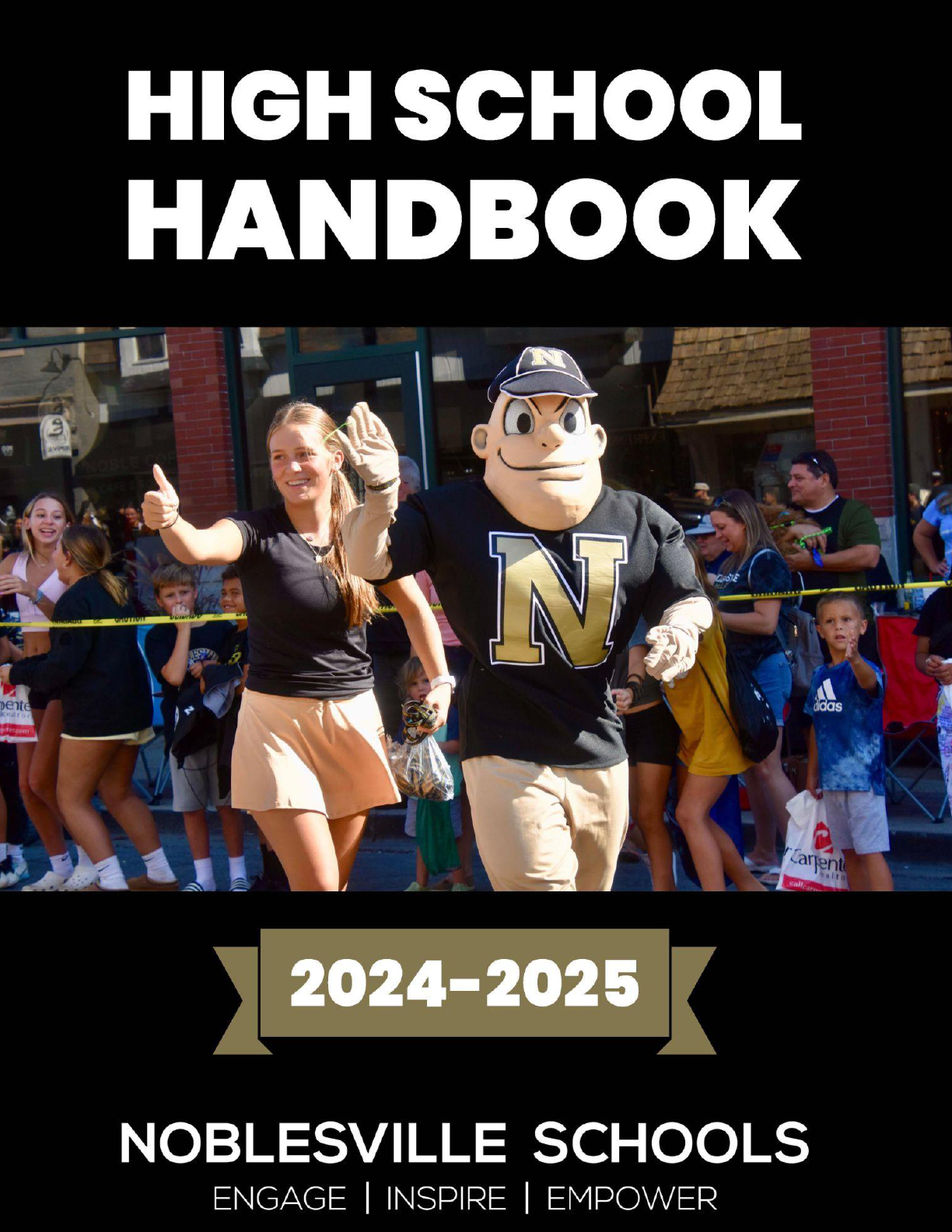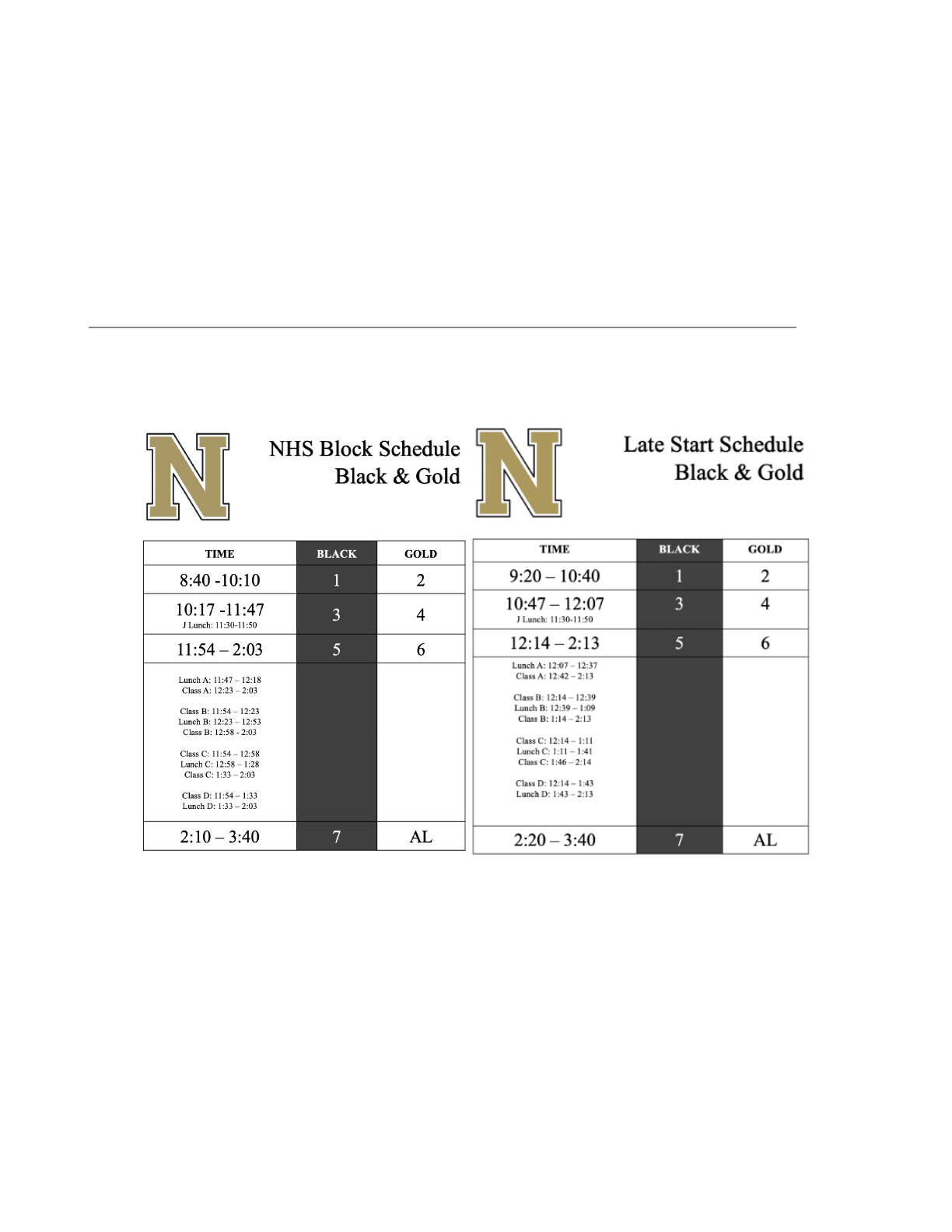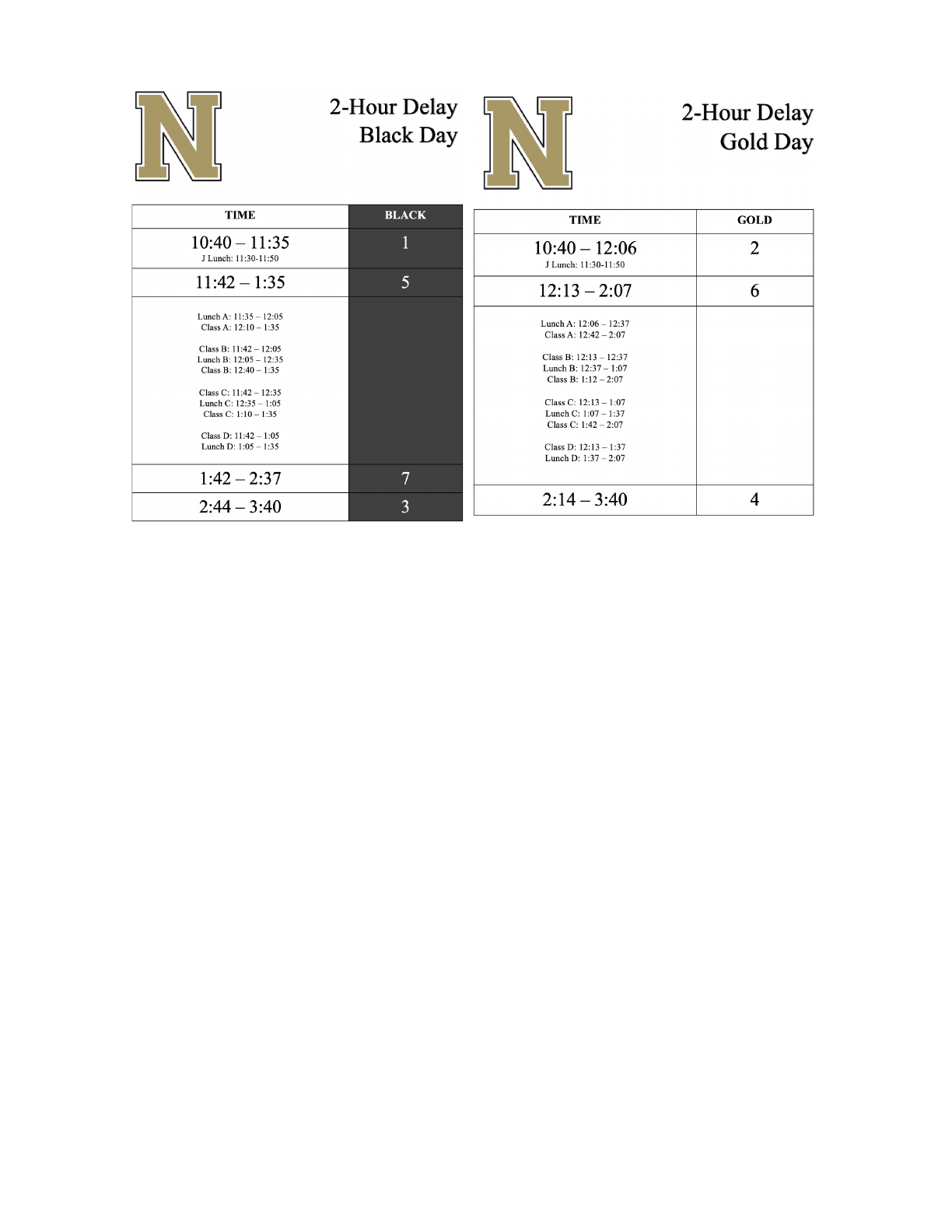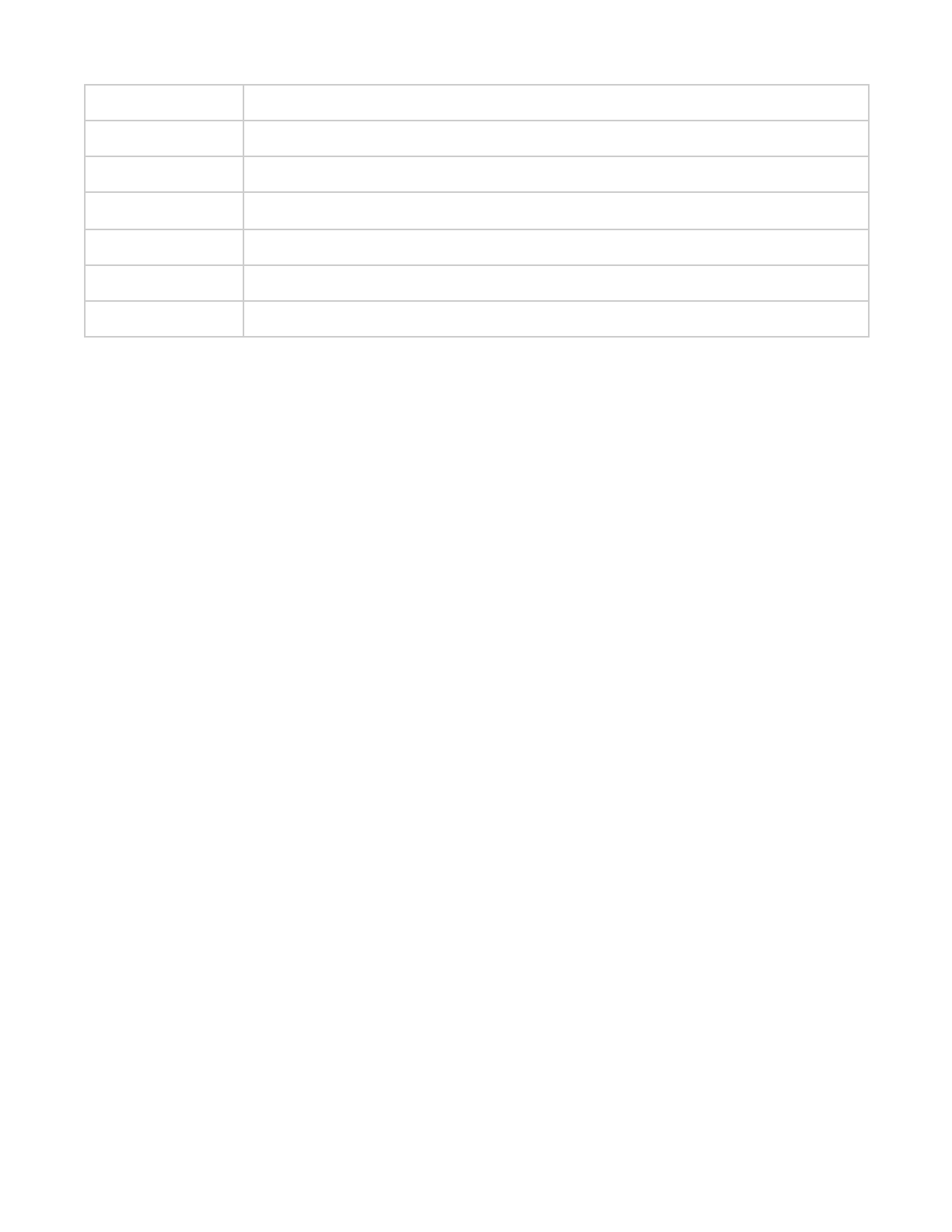

Noblesville Schools Vision
We are:
• Engaged in intellectual pursuits
• Inspired to challenge the present
• Empowered to adapt, innovate, and succeed today and tomorrow.
Noblesville Schools Mission
Noblesville Schools creates an inclusive, learner-centered culture that develops
future-ready skills through relevant experiences supported by strong relationships
that celebrate diversity and promote equity among students, staff, parents, and
the community.
Noblesville Schools Nondiscrimination and Access to Equal Education
Opportunity (Policy A100)
The Corporation does not discriminate on the basis of race, color, national origin,
sex (including sexual orientation or transgender identity), disability, age (except as
authorized by law), religion, military status, ancestry, or genetic information
(collectively, "Protected Classes") in its educational programs or activities and does
not tolerate harassment of any kind.
Equal educational opportunities shall be available to all students, without regard to
the Protected Classes, age (unless age is a factor necessary to the normal
operation or the achievement of any legitimate objective of the program/activity),
place of residence within the boundaries of the District, or social or economic
background, to learn through the curriculum offered in this Corporation. Educational
programs shall be designed to meet the varying needs of all students.
Title VI, Title IX, Section 504, and Non-Discrimination – Student Complaints
Executive Director of Equity and Inclusion
Phone: 317-773-3171
18025 River Rd.
Noblesville, IN 46062
2

Section 504 Coordinator, Americans with Disabilities Act Coordinator
Executive Director of Student Services
Phone: 317-773-3171
18025 River Rd.
Noblesville, IN 46062
Nondiscrimination on the Basis of Sex in Education Programs or Activities
The Corporation does not discriminate on the basis of sex (including sexual
orientation or gender identity) in its education programs or activities and is required
by Title IX of the Education Amendments of 1972 and its implementing regulations
not to discriminate in such a manner. The requirement not to discriminate in its
education program or activity extends to admission and employment.
The Corporation is committed to maintaining an education and work environment
that is free from discrimination based on sex, including sexual harassment.
The Corporation prohibits Sexual Harassment that occurs within its education
programs and activities. When the Corporation has actual knowledge of Sexual
Harassment in its education program or activity against a person in the United
States, it shall promptly respond in a manner that is not deliberately indifferent.
Pursuant to its Title IX obligations, the Corporation is committed to eliminating
Sexual Harassment and will take appropriate action when an individual is
determined responsible for violating this policy. Members of the Corporation
community who commit Sexual Harassment are subject to the full range of
disciplinary sanctions set forth in this policy. Third Parties who engage in Sexual
Harassment also are subject to the disciplinary sanctions listed in this policy. The
Corporation will provide persons who have experienced Sexual Harassment
ongoing remedies as reasonably necessary to restore or preserve access to the
Corporation’s education programs and activities.
The Corporation designates and authorizes the following individual to oversee and
coordinate its efforts to comply with Title IX and its implementing regulations:
3

Title VI, Title IX, Section 504, and Non-Discrimination – Student Complaints
Executive Director of Equity and Inclusion
Phone: 317-773-3171
18025 River Rd.
Noblesville, IN 46062
Anti-Harassment
It is the policy of the Corporation to maintain an education and work environment
that is free from all forms of unlawful harassment, including, but not limited to,
sexual harassment. This commitment applies to all School Corporation operations,
programs, and activities. All students, administrators, teachers, staff, and all other
school personnel share responsibility for avoiding, discouraging, and reporting any
form of unlawful harassment. This policy applies to unlawful conduct occurring on
school property, or at another location if such conduct occurs during an activity
sponsored by the Corporation.
The Corporation will vigorously enforce its prohibition against harassment based on
sex (including sexual orientation and/or transgender identity), race, color, national
origin, religion, disability or genetic information, that are protected by federal civil
rights laws (hereinafter referred to as unlawful harassment) and encourages those
within the School Corporation community as well as third parties who feel
aggrieved to seek assistance to rectify such problems.
The following individual shall serve as Anti-Harassment Complaint Coordinator:
Executive Director of Equity and Inclusion
Phone: 317-773-3171
18025 River Rd.
Noblesville, IN 46062
4

Child Abuse Reporting
All employees are required to immediately report suspected child physical and/or
sexual abuse to law enforcement or the Department of Child Services. (I.C. 31-33-1
et. seq.). Reports should be made to DCS through the reporting hotline:
1-800-800-5556.
Parents’ and Students’ Rights Concerning Educational Records (FERPA) (Policy
E175)
Each student's records will be kept in a confidential file located at the student's
school office. The information in a student's record file will be available for review
only by the parents or legal guardian of a student, adult student (18 years of age or
older), and those authorized by Federal law and Corporation regulations.
A parent or adult student has the right to:
● Inspect and review the student's education records within 45 days after
receipt of the request. The school has a form which can be used to submit a
request. The Custodian of Records will notify the parent or adult student of the
time and place where the records can be inspected.
● Request amendments if the parent or adult student believes the record is
inaccurate, misleading, or otherwise in violation of the student's rights. The
school has a form which may be used to identify which information in the
record the parent or adult student believes is inaccurate or misleading and to
specify why it is inaccurate or misleading.
● Consent to disclosures of personally-identifiable information contained in the
student's education records, except to those disclosures allowed by the law.
The school's administrative guideline describes those exceptions and is
available upon request.
● Challenge Corporation noncompliance with a parent's request to amend the
records through a hearing. If the Custodian of Records decides not to amend
the record, the parent or adult student will be so notified and provided the
opportunity for a hearing. Additional information concerning the hearing will
be provided when notified of the opportunity for a hearing.
● File a complaint with the U.S. Department of Education, 400 Maryland Avenue
SW, Washington, D.C. 20202.
● Obtain a copy of the Corporation's Policy E175 on student records.
5

ESSA/Parents’ Right to Know
All parents may request, and [the school corporation/Noblesville Schools]will
provide the parents on request (and in a timely manner), information regarding the
professional qualifications of the student’s classroom teachers, including: (i)
Whether the student’s teacher— (I) has met State qualification and licensing criteria
for the grade levels and subject areas in which the teacher provides instruction; (II)
is teaching under emergency or other provisional status through which State
qualification or licensing criteria have been waived; and (III) is teaching in the field
of discipline of the certification of the teacher. (ii) Whether the child is provided
services by paraprofessionals and, if so, their qualifications.
Medical Insurance
Noblesville Schools does not carry insurance to cover student accidents or injuries.
Child Find (Policy C300)
The School Corporation will identify, locate, and evaluate students at least three (3)
years of age but less than twenty-two (22) years of age who are in need of special
education and related services, regardless of whether the student is enrolled in a
school. This includes students who:
A. have legal settlement within the School Corporation;
B. attend a nonpublic school, are served by an agency, or live in an institution
located within the School Corporation;
C. are homeless students as defined at 511 IAC 7-32-46;
D. are wards of the state;
E. are highly mobile students, including migrant students; or
F. are suspected of being students with disabilities in need of special education
even though they are advancing from grade to grade.
To effectuate its affirmative, ongoing Child Find obligations under the Individuals
with Disabilities Education Improvement Act (IDEA), 511 IAC 7-32 et. seq (Article 7),
and Section 504 of the Rehabilitation Act, the School Corporation shall do the
following:
1. Continuously post the notice of non-discrimination on the School Corporation
website;
2. At least annually, publicize the notice of non-discrimination in student
handbooks and parent handbooks;
6

3. When School Corporation staff deems appropriate, initiate a conversation
with a student’s parent(s) regarding the MTSS process and/or seeking
parental consent for an initial evaluation for special education;
4. Encourage communication between the School Corporation McKinney-Vento
Homeless Liaison and the School Corporation Office of Special Education to
identify students in need of special education and related services;
5. Encourage communication between the School Corporation Social Worker
and the School Corporation Office of Special Education to identify students
potentially in need of special education and related services;
6. Encourage communication between nonpublic schools located within the
School Corporation and the School Corporation Office of Special Education to
identify students potentially in need of special education and related services;
7. Provide parents with the Procedural Safeguard (English), Procedural
Safeguard (Spanish) upon the initial referral or parent’s request for
evaluation, or upon the parent’s request;
8. Conduct hearing screenings of all students in grades 1, 4, 7, and 10 to identify
students potentially in need of special education and related services;
9. Provide public awareness to inform citizens of educational opportunities
available to individuals with disabilities and maintaining documentation of
such activities.
Notice of Parental Rights/Section 504
This Noblesville Procedural Safeguards Section 504 document is meant to inform
parents of laws about the evaluation and/or special instruction that may be offered
to their child. If parents have any questions, contact the Noblesville Executive
Director of Student Services, Section 504 Coordinator at (317)773-3171. Parents also
have the right to meet with the Superintendent or designee, the local School Board
or the U.S. Department of Education’s Office for Civil Rights to resolve objections to
either evaluation or educational placement. The School will provide information
about free or low-cost legal services that may be available to help you understand
your rights upon request.
Seclusion and Restraint (Policy C400)
Noblesville Schools believes that maintaining an orderly and safe environment is
conducive to a healthy learning environment and is an appropriate expectation of
all students and employees within the school corporation. The Board recognizes
that there are times when it becomes necessary for employees to use reasonable
7

physical restraint and/or isolated time out/seclusion to protect a student from
causing harm to him/herself or to others. In accordance with the law, Noblesville
Schools has adopted a Seclusion/Restraint Plan to establish guidelines for the use
of seclusion/restraint. Noblesville Schools Seclusion/Restraint Plan can be found by
clicking on the following link: Seclusion and Restraint Plan
McKinney-Vento Homeless Information (I.C. 20-50)
The McKinney-Vento Homeless Assistance Act (reauthorized under Title X, Part C of
the No Child Left Behind Act of 2001) ensures rights and services for children and
youth experiencing unstable housing. This federal law removes barriers to
education for students in need. According to the U.S. Department of Education,
children and youth living in the following situations are considered homeless (this
definition is unique to schools):
● Doubled up with family or friends due to economic hardship;
● Living in motels or hotels for lack of other suitable housing;
● Runaway children and youth;
● Homes for unwed or expectant mothers for lack of a place to live;
● Homeless and domestic violence shelters;
● Transitional housing programs;
● Abandoned buildings or on the street;
● Public places not meant for housing;
● Cars, trailers, and campgrounds; or
● Migratory children staying in housing not fit for habitation.
Contact the McKinney Vento Liaison at your child's school for further information.
Parental Access to Informational Materials and Surveys (Policy C225)
The corporation provides parental access to instructional materials and surveys in
accordance with Indiana law and school board olicy C225.
Emergency Closing or Delay of School
Notifications regarding weather delays and closings for Noblesville Schools will be
communicated through the following means:
● Parent/staff email through address on file with district
● Parent/staff phone call through number on file with district
● Parent/staff text through cell phone number on file with district
● Noblesville Schools Facebook page
● Noblesville Schools Twitter page
8

● Local TV media outlets
All parents are advised to provide current contact information through the
registration process and whenever changes occur since this messenger system will
also be used in the case of emergency. These changes can be made through
PowerSchool.
Classroom teachers will communicate eLearning expectations through the Canvas
learning management system. Students without access to a device or internet at
home will have additional days to complete eLearning work.
ParentSquare
Noblesville Schools uses ParentSquare for building and district communication with
families. Following enrollment, parents and guardians should receive an invitation
via email to login and set up their account. Parents and guardians with an existing
account may login at https://www.parentsquare.com/signin.
To update your contact information through the ParentSquare website:
1. Sign into ParentSquare.
2. Click on your name then My Account in the upper right.
3. Click on Edit Account in the left menu.
4. Add email and phone numbers.
5. Click Save.
To update your contact information through the ParentSquare mobile app:
1. Open the app and choose the 3 lines in the upper left.
2. Choose Account from the left menu then My Account
3. Choose Edit in the upper right.
4. Edit or add phone numbers and emails.
5. Choose Save in the upper right when finished
Parent/Family Engagement (Policy H100)
Noblesville Schools will involve parents and families in jointly developing, and
agreeing on, the Corporation’s policy and local plan in accordance with the
guidelines below. Each Title I school will create a building-specific parental and
family engagement plan in accordance with the guidelines and each of the
students participating in Title I program will receive a copy of the parental and
family engagement policy and plan guidelines.
9

Instruction on Human Sexuality (Policy C225)
The corporation provides instruction on human sexuality in accordance with
Indiana law and school board Policy C225.
Audio, Video, and Digital Recording/Cameras (Policy G350)
Everyone on Corporation property may be subject to video recording by the
Corporation (surveillance) in areas where individuals do not have a reasonable
expectation of privacy, including but not limited to: classrooms, office areas, break
rooms, parking lots, hallways, eating areas, etc. Recording by others is generally
prohibited on Corporation property, as it frequently materially interferes with the
Corporation’s educational mission; however, exceptions exist as described
elsewhere in board Policy G350. The Superintendent or his or her designee shall
have the ultimate authority to determine if recording should be permitted to
support the Corporation’s educational mission.
The public is permitted to record public school board meetings in accordance with
State law.
Directory Information & Information Requested by Recruiters
Directory information can be provided upon request to any individual, other than a
for profit organization, even without the written consent of a parent. The school has
designated as student "directory information" the following: a student's name;
address; telephone number; photograph; date and place of birth; major field of
study; participation in officially recognized activities and sports; height and weight,
if a member of an athletic team; dates of attendance; date of graduation; or
awards received. School assigned email accounts are designated as "directory
information" for the limited purpose of facilitating students' registration for access
to various online educational services, including mobile applications/apps that the
student will utilize for educational purposes.
Parents may refuse to allow the Board to disclose any or all “directory information”
upon written notification to the Board. For further information about the items
included within the category of directory information and instructions on how to
prohibit its release you may consult any building principal or the Board’s directory
information listing (Policy E175 ).
In accordance with Federal and State law, the school shall release the names,
addresses, and telephone listings of secondary students to a recruiting officer for
10

any branch of the United States Armed Forces or an institution of higher education
who requests such information. A secondary school student or parent of the student
may request that the student's name, address, and telephone listing not be
released without prior consent of the parent.
Determination of Legal Settlement and Eligibility of Enrollment of Students
Without Legal Settlement in the Corporation (Policy C125)
Noblesville Schools will educate, tuition free, students who have legal settlement in
the Corporation, and students enrolled according to the requirements of I.C.
20-26-11-2.The Corporation is not accepting the transfer of any student who does
not have legal settlement within the Corporation. The Corporation verifies Indiana
residency and reports on student enrollment (Average Daily Membership) in
accordance with applicable statute and Indiana Department of Education
guidance.
Pursuant to IC 20-26-11-6.5, and except as permitted by law for capacity, discipline,
or attendance issues, the Corporation shall accept a transferring student who does
not have legal settlement in the school corporation and who has a parent who is a
current employee of the transferee school corporation, a student who has moved
once the school year has started, and a student who has senior rights IC 20-26-11-2
Sec (8)
Wellness (Policy A275)
Noblesville Schools promotes student wellness by supporting healthy choices, good
nutrition, and physical activity as part of the total learning environment. This policy
applies to all students, staff, and schools in the Corporation.
The Corporation will teach, model, encourage, and support healthy eating by all
students. The Corporation will provide nutrition education and engage in nutrition
promotion that is designed to provide students with the knowledge and skills
necessary to promote their health. Nutrition topics shall be integrated within the
comprehensive health education curriculum and other curricular offerings such as
math, science, language arts, social sciences, and electives according to standards
of the Indiana Department of Education and federal law. Schools will link nutrition
education activities with existing coordinated school health programs or other
comparable comprehensive school health promotion frameworks.
11

The Board supports the health and well-being of students by promoting physical
activity through physical education, recess and other physical activity breaks;
before and after-school activities; and walking and bicycling to school.
Health Services
Medical Needs at School (Policy C525)
Student Concussions and Cardiac Arrest (Policy C525)
Corporation employees shall abide by legal obligations regarding student
athletes and avoiding injuries, including informing and educating coaches,
student athletes, and parents of student athletes regarding the nature and
risk of concussion, head injury, and sudden cardiac arrest to student athletes.
The Board has determined that it may enhance school safety to have an
automatic external defibrillator (AED) placed in building(s) within the
Corporation for use by employees with proper training.
Medications: Pickup/Drop Off
A nurse will meet a parent in the building’s designated area to discuss and
obtain the medication, review the physician's orders, and have the parent
sign the permission form to administer the medications.
Consent/HIPAA Authorization for School Nurses to Treat
An electronically signed Consent To Treat must be on file prior to the
start of each school year in order for a student to receive medical care
from a Community Health Network school nurse. The Consent/HIPAA
Authorization School Nurse Health Clinic Services form is located in the
PowerSchool Parent Portal under the Forms link located in the left menu.
Communicable Diseases
If a student is ill, has a communicable disease that is transmissible through
normal school contacts, or poses a substantial threat to the health and safety
of the school community, the school nurse may send the student home. The
nurse will communicate with the student"s parent/guardian and describe the
nature of the illness. The student may return to school when the following
criteria are met:
12

● The student’s return to school meets the guidelines in the current
edition of the Indiana State Department of Health Communicable
Disease Reference Guide for Schools and; if recommended,
● The student or parent provides a letter from the student’s medical
provider stating it is safe for the student to be readmitted.
Confidentiality
All health information will be treated as confidential, shared only with staff or
EMS personnel on a need-to-know basis. Changes in the medical status or
medications should be promptly reported to the school nurse throughout the
school year. Parents/guardians with additional concerns are encouraged to
meet with the school principal and school nurse to ensure the medical and
privacy needs of the student are addressed properly.
Emergency Medical Treatment
In accordance with School Board Policy C525, if an accident or
emergency occurs on school property; off school grounds at a school
activity, function, or event; or traveling to or from school for a school
activity, function, or event, Corporation employees should take all
necessary steps to render assistance to the student in good faith, which
may include summoning medical assistance, administering first aid by
persons trained to administer first aid, notifying administration, notifying
the student’s parent, and filing accident reports. Parents and eligible
students have the right to deny emergency medical and dental services.
A form to withhold these services is available at your child’s school. Your
child’s school must receive this form within 20 business days of the start
of school or within 20 business days of enrolling your student in order to
deny emergency medical and dental services.
Fever/Illness
Students may be sent home for illness at the discretion of the school nurse.
Reasons to be sent home include, but are not limited to, a fever of 100.4
degrees or above, vomiting, and diarrhea. Any student with a fever should be
kept home until he/she is fever-free without the use of fever-reducing
medication for 24 hours. Students should also have no signs of vomiting or
diarrhea for 24 hours prior to returning to school.
13

Health Conditions
Parents/guardians should plan to provide the school with any medical
information, including medical diagnoses, medications, unusual illnesses,
accidents, and other information needed to serve each child best. If a
medical condition requires a health plan, the nurse will meet with the
parent/guardian to develop a plan of care and obtain orders from the child’s
medical provider.
Head Lice
Parents have the primary responsibility of assisting in the prevention and
management of head lice cases through regular checks of their child"s
hair and starting immediate treatment when head lice are detected. If at
all possible, students should not be excluded from school for having head
lice. The management of head lice should not disrupt the educational
process of the child. The need to exclude students from school will be
determined on a case-by-case basis.
Immunizations
Indiana law, IC 20-34-4-5, requires that each student have either a
complete immunization record or a current medical or religious
exemption on file in the school nurse’s office by the district’s deadline
date. If beyond the deadline, the student will be excluded from attending
Noblesville Schools until the student has met the requirements of
Indiana law.
Meningococcal Disease: information is located on Noblesville Schools
Health Services Department website- Immunizations
Human Papillomavirus (HPV) Infection: information located on Noblesville
Schools Health Services Department website - Immunizations
Medications at School
As per Board policy, Noblesville Schools defines medications as
FDA-approved medicines, including those prescribed and
non-prescribed (over-the-counter) medications. Non FDA approved
products will not be given at school. This includes, but is not limited to,
herbal supplements and other homeopathic products. Requests to
14

administer research medication during school hours will be evaluated on
an individual basis by the district administration in consultation with the
partnering hospital’s school nursing consultation team, the student’s
prescribing physician, and the parent/guardian.
To safeguard the transportation of medication to and from school, all
prescription and over-the-counter medication should be brought into the
health center by a parent or guardian. Students are not permitted to
carry any medication without a physician's statement in writing. Any
unused medication unclaimed by the parent by the last student day of
school will be destroyed.
Medication at school must include the following:
● Over-the-counter medication must be in the original package with
the dosing information present. The nurse can only give the
medication as directed on the manufacturer’s package label. If your
medical provider has ordered your child to take the medication in a
different manner than the label instructs, the school nurse will need
a prescription order from your medical provider.
● Prescription medication must be in a prescription bottle with the
most current dosing information, the student's name on the label,
and a written order from your medical provider.
School-supplied stocked medication: The school board policy allows
students, with prior written permission from parents, to receive stocked
medication. The school will provide up to four doses of specified
medications if necessary for the child to remain at school. The stocked
medication will be available from 10 am – 3 pm. Please supply
medication to the nurse’s clinic if your child will use more than four
doses during the school year.
The following products are available in the nurse’s office.
Parents/guardians should notify the school nurse if these products are
not acceptable to use for their child.
● Vaseline
● Buffered normal saline solution
● Contact Lens Solution
15

● Calamine lotion
All final decisions on the administration of medication will be made by
Noblesville Schools district administration.
Medication for Chronic Disease or Medical Condition
A student with a chronic disease or medical condition may possess and
self-administer medication for the chronic disease or medical condition if
the following conditions are met:
The student’s parent has filed an authorization with the student’s principal for
the student to possess and self-administer the medication. The written
authorization must include a physician/healthcare provider stating in writing
that:
● The student has an acute or chronic disease or medical condition for
which the physician has prescribed medication.
● The student has been instructed in how to self-administer the
medication.
● The nature of the disease or medical condition requires emergency
administration of the medication.
The parent’s authorization and physician’s order must be filed with the
student’s principal annually.
Vision/Hearing Screenings
Indiana Public Law requires an annual visual acuity screening of each
student enrolled in or transferred to kindergarten or first, third, fifth, and
eighth grades. Vision screenings are conducted by the school nurse staff,
the Lions Club, and local optometrists. The school nurse will notify a
parent/guardian if more comprehensive testing is recommended.
Indiana Public Law requires an annual hearing screening test of each
student enrolled in or transferred to grade first, fourth, seventh, and tenth.
The hearing screenings are conducted by Noblesville Schools Speech
Language Pathologists. The Speech Language Pathologist will notify a
parent/guardian if more comprehensive testing is recommended.
16

Technology: Student Education Technology Responsible Use and Safety
Using your device is a privilege, and any privilege comes with responsibility. Here
are the expectations for using your personal devices at school or anytime you are
using school-provided devices.
Digital Citizenship
● You are responsible for modeling positive digital citizenship. Treat
people with dignity and kindness when using technology and online.
● Be honest and ethical in all digital communications.
● Be kind and avoid threatening or insulting, gossiping, or teasing others
with cruelty while you are online or using a computer.
● Give credit to authors or sources when using information or ideas that
are not your own. Know that failure to cite sources of information
properly is called plagiarism and is a form of cheating.
● Understand that others may see things you post at school and at home
and that things that are posted on the internet can be seen by anyone
in the world.
● Do not share personal information (either your own or another
student’s), including where you live, details about family or friends
(including names), your age, birthday, home address, or telephone
number on the Internet.
● Consider whom you are communicating with and consider how they
might interpret your words.
● Give constructive criticism and provide comments in ways that help
others feel supported.
● Use respectful and appropriate language without swearing,
name-calling, or causing others to feel uncomfortable due to their
gender, race, appearance, behavior, or beliefs.
● Fact-check information before you share it digitally.
● Do not impersonate others or try to trick people into thinking something
you wrote was done by someone else.
Learning and Curiosity
School technology and networks are primarily provided to help support your
learning and curiosity.
● Use technology to learn new things.
● Use technology to complete school activities or assignments.
17

● Use your device to check information and verify its accuracy.
● Give credit to the creators of any content you use that is not your own.
Personal Responsibility and Safety
School computers and internet communication tools must be used properly
and responsibly.
● If you find content inappropriate on the internet, notify a teacher or a
trusted adult, especially if you find inappropriate material while
completing an assignment.
● Take care of computers and all technology equipment from the school
as if it belonged to you.
● Respect the district network’s security measures and only download
apps or content you have permission to access.
● Only log in to the computer or network with your own username and
password.
Understand that using any school technology, networks, or personal devices
at school is a privilege you must earn through responsible use, but we all
make mistakes.
When you do something with your device that is not in line with this
agreement, you will let a trusted adult know and ask them to help you make it
right. If you can’t consistently keep your part of this agreement, understand
that privileges may be removed for a time and that you may face additional
consequences.
AI Tools & Systems
● AI should not be used without permission from your course teacher.
Using AI without the teacher’s permission could fall under academic
dishonesty. Students should discuss the use of AI with teachers before
using it to aid assignments, projects, research, or assessments.
● Always review and critically assess outputs from AI tools before
submission or dissemination. Students should never rely solely on
AI-generated content without review.
● Be aware that AI-generated content may possess biases or
inaccuracies. Always verify AI-produced results using trusted sources
before considering them in academic work.
18

● Students must not use AI tools to create or propagate harmful,
misleading, or inappropriate content.
● AI tools will be used for educational purposes only. Misuse or malicious
use of AI technologies will lead to disciplinary action.
School Issued Email
Students will be assigned a school email account that they must utilize for all
school-related electronic communications, including those to staff members,
individuals, and/or organizations outside the Corporation with whom they
communicate for school-related projects and assignments.
As directed and authorized by their teachers, students shall use their
school-assigned email account when signing up/registering for access to
various online educational services, including mobile applications/apps that
the student will utilize for educational purposes. Students shall not access
social media for personal use from the Corporation’s network; they may be
permitted to access social media for educational use per their teacher's
approved plan for such use.
Technology Device Misuse
Students and employees shall not take any action that could cause damage
to Corporation Technology Resources, including knowingly transmitting a
computer virus or other malware that has the capability to damage or impair
the operation of electronic technologies or the technology of another person,
provider, or organization. Dedicated users of checked-out school technology
equipment assume responsibility for returning the equipment on time and in
the same condition as it was obtained, and failure to return the equipment on
time and/of in the same condition may result in a requirement to
compensate the Corporation for the loss or poor condition of the device.
Use of Corporation Technology Resources is at the individual’s own risk. The
system is provided on an “as is, as available” basis. The Corporation is not
responsible for any damage employees, students, guests, or third parties may
suffer. The Corporation is not responsible for the accuracy or quality of any
advice or information obtained through or stored on Corporation Technology
Resources, nor is it responsible for damages or injuries from improper
communications or damage to property used to access Corporation
19

Technology Resources and online resources. The Corporation is not
responsible for financial obligations arising from the unauthorized use of
Corporation Technology Resources.
Nutrition and Food Services
Noblesville Schools Nutrition and Food Service Department knows that good
nutrition and learning go hand in hand. Our goal is to properly prepare and serve
nutritious, appealing meals that meet Federal Dietary Guidelines. Our Nutrition and
Food Service staff is committed to students’ total educational experience by
meeting their nutritional needs and reinforcing healthy eating habits in a sanitary
and friendly environment. To ensure we provide the best meals possible, a
Registered Dietitian creates and analyzes all our menus. All schools offer breakfast
every day in their cafeteria, beginning when the school doors open. Breakfast will
also be available when there is a 2-hour delay. Studies show that students who eat
breakfast have improved classroom behavior, attendance, and test scores.
Students learn and perform best when they have eaten this important meal. More
information regarding menus, lunch prices, nutritional information, meal assistance,
and more is available here.
Students can bring their own lunch from home and purchase a carton of milk and
other food items in the school cafeteria. Students cannot bring caffeinated
beverages to consume during lunch. Also, meals from fast food restaurants are not
to be brought into the cafeteria. Students are expected to practice good table
manners and be responsible for the cleanliness of their place at the table.
Food Allergies
Food allergies are presenting increasing challenges for schools. The risk of
accidental exposure to foods can be reduced in the school setting if schools
work with students, parents, and physicians to minimize risks and provide a
safe educational environment for food-allergic students.
Noblesville Schools expects that specific building-based protocols and/or
activities will be established to ensure that the health needs of students will
be met in the least restrictive environment. In order to assist students with
developing the skills necessary to participate in all educational programs,
building-based teams will communicate with parents and students to allow
20

students to gradually assume more responsibility for maintaining their safety
as they advance from elementary school to secondary school.
Forms of Payment
All school cafeterias utilize a pre-pay system, meaning money should be on
account and available before purchases are made. Online meal payments
can be made at LinqConnect. An account is free of charge and provides
additional options such as viewing lunch account balances and activity,
setting up customized, low-balance reminders, and transferring funds
between children. If parents choose to make deposits using LinqConnect, a
nominal fee is charged. Cash and checks are also accepted. Money should
be in a sealed envelope with the child’s first and last name. At the elementary
level, money can be given to the homeroom teacher. At the secondary level,
money can be dropped at the lunch payment lock box located in Student
Services. Students must have money in their accounts in order to purchase
extras/snacks.
Free and Reduced Price Meals
Free and reduced-price meals are available to families who qualify. A new
application must be completed every school year after July 16 unless the
parent/guardian is notified that a student has been pre-approved through
Direct Certification. Direct Certification notifications are sent to households by
email. Only one (1) free or reduced-price meal application is required per
family, but all children must be listed to be certified. Applicants will be
emailed about a student's status within ten working days. Until this
notification is received, the child must bring home lunch or money to pay for
lunch.
A family who chooses to apply has two ways to do so:
1. Complete an application online at LinqConnect for quick processing.
2. Pick up a paper application at any school or at the Educational Services
Center, 18025 River Rd, Noblesville, IN 46062. All completed paper
applications can be submitted to any school office, cafeteria, or at the
Educational Services Center.
21

Food Service Account Charges (Policy F176)
Noblesville Schools Nutrition and Food Service Department wants to ensure
that every student has access to meals daily. Per USDA guidelines, Noblesville
Schools is not allowed to incur debt from unpaid meal charges. We do
recognize that there can be extenuating circumstances that may cause a
student to not have money in their lunch account. When money is not
available on the account, a school meal may be charged to the account.
Food and beverages sold outside of the school meal will not be permitted to
be charged to the account. When an account goes into the negative, the
parent/guardian will receive an email notification. Courtesy calls will be made
when accounts exceed $25 in meal charges. Unpaid charges are subject to
further collection efforts. Positive and negative account balances remaining
at the end of the school year will carry over and be available for use the
following year. Refunds may be requested when a child graduates from High
School or withdraws from Noblesville Schools.
Indoor Air Quality
The Indoor Air Quality (IAQ) Coordinator shall serve as the lead contact person for
matters related to indoor air quality in the facilities operated by the Corporation.
The following individual shall serve as Indoor Air Quality Coordinator:
Director of Buildings and Grounds
317-773-3171
Notification of Asbestos Management Plan
This information is being published to comply with the 40 CFR 763 subpart
E-asbestos containing materials in schools. This regulation, commonly known as
the “AHERA” rule, requires local education agencies, such as this one, to perform
certain tasks in regard to the presence and control of asbestos containing
materials in the buildings under the jurisdiction of the local agency. These include,
but are not limited to:
● Developing an asbestos management plan, which is designated to outline
procedures and guidelines for the inspection, re-inspection, and periodic
surveillance of asbestos-containing materials that are present in the
buildings.
● Providing awareness training and additional training to selected employees.
22

● Periodically notifying all workers and occupants, or their local guardians,
parent-teacher organizations, and collective bargaining organizations of the
availability of asbestos management plans, the location of same, and the
times that plans may be reviewed.
This notification is to advise all patrons, occupants, or their legal guardians,
collective bargaining organizations, and parent-teacher organizations, that the
asbestos management plans required under this act are available for review upon
request. A copy of the plans for all buildings under the jurisdiction of this local
education agency are located in the administration building which is located at
18025 River Road, Noblesville, IN 46062; telephone number (317)773-3171. Plans for
individual schools and other buildings are located in the administration office of
each building. Any person can view the plans during normal business hours of the
particular school. Interested parties wishing to inquire about the hours and times
that the plans are available should call the above number.
At this time, the management plans can provide information regarding inspections,
response action, and post-response action activities, including periodic
reinspection and surveillance activities that are planned or in progress. Any
inquiries regarding any facet of the regulation or the management plans should be
directed to Mr. David Hortemiller, Chief Financial Officer, at the above number during
regular business hours.
Students/Parents Pesticide Application Notice (Policy G250)
On occasion, the Corporation may find it necessary to utilize pesticides in order to
control a pest problem. When these occasions occur, the school will use the lowest
risk products available. If higher risk pesticides must be used, notices will be sent to
all individuals registered in the school corporation’s Pesticide Notification Registry.
Parents, legal guardians, and school staff will be notified of specific pesticide
applications made at the school. To receive notification, you must be placed on the
notification registry. The Form is available in each school’s office. Notification will be
given at least two days before planned pesticide applications during the normal
school year. In addition, for pesticides applied anytime during the year, emergency
application notifications will be given as soon as possible. Notifications need not be
given for pesticide applications recognized by law to pose little or no risk of
exposure to children or staff. The Corporation will keep records of pesticide
23

applications and information about the pesticides used for two years. Anyone may
request to review these records by contacting the corporation’s Director of Buildings
and Grounds at 317-773-3171.
Animals on School Property (Policy G275)
Noblesville Schools maintains a clear policy regarding animals on school property,
emphasizing the inclusion of service animals for individuals with disabilities while
restricting companion and emotional support animals. A service animal, defined as
a dog or occasionally a miniature horse trained to assist those with disabilities
through specific tasks, is permitted on school grounds, with students allowed to act
as handlers for their service animals. The policy distinguishes between various roles
animals can have, including therapy dogs, which provide mental health support
and are approved by staff and the principal, and companion animals, which are not
permitted on school property. The humane treatment of all animals on premises is
mandated, ensuring they receive proper care and are not subjected to cruelty.
Service Animal Application Form is to be completed which addresses the use of
service animals and animals used for curricular purposes including therapy dogs.
Idling School Buses and Other Vehicles on School Property (Policy G225)
The Noblesville School Board recognizes that although vehicle idling is necessary in
certain circumstances, it poses health risks to the community and consumes
financial resources of the Corporation. The Board therefore adopts the following
policy to minimize unnecessary vehicle idling on school grounds:
1. Subject to the exceptions listed below, vehicles should not idle for more than
five (5) minutes in areas where vehicle exhaust is likely to be drawn in
school buildings (“Designated Area”). The Superintendent or a designee
may appoint “Designated Areas” where vehicle exhaust is likely to be drawn
into school buildings and post notices advising drivers of such areas.
2. Vehicles may idle for longer than five (5) minutes in Designated Areas in
any of the following circumstances:
a. In temperatures below thirty-two (32) degrees (32°F) and above
eighty-five (85) degrees (85°F), idling is permitted to maintain the
vehicle’s interior temperature for the comfort and safety of both driver
and passengers.
b. Idling is permitted to maintain safety or in an emergency, including
but not limited to the following situations:
i. using equipment to load and unload special needs students.
24

ii. using a defroster on windows before departing.
iii. using headlights or other warning signals.
c. Idling is permitted as part of pre-trip safety inspections or if
necessary to make vehicle repairs.
Bus Conduct and Safety
These rules are designed to promote safety on the buses at all times
because the safety of all students is the school's top priority. School bus
transportation is a privilege, and if this privilege is denied, parents/guardians
are responsible for transporting the child to and from school.
Students will ride the bus to which they have been assigned unless the parent
and an administrator have made other arrangements. At the bus stop,
students are to:
● Be on time and board the bus only at the regularly assigned stop
● Stay out of the street and away from the road
● Enter the bus when the bus comes to a full stop and the driver has
opened the doo.
● Wait their turn and not push when entering the bus
● Refrain from behaviors that are a violation of the school Code of Conduct
The Noblesville Student Code of Conduct applies while students are on the
bus. Additionally, on the bus, students are to:
● Always obey the driver promptly and respectfully
● Be seated promptly and stay in their assigned seat
● Keep all books on their lap or contained in a pack or bag
● Be courteous and not use inappropriate language
● Speak in low tones
● Never push, shove, scuffle, or engage in horseplay
● Keep all belongings inside the bus, including head, hair, hands, and feet
● Never smoke or fight
● Never throw objects inside or outside the bus
● Have skateboards off the bus
● Treat bus seats and equipment with care and respect
● Keep the bus clean and orderly
25

Inappropriate and/or unsafe conduct on the bus will result in temporary
removal from the bus and may result in indefinite removal. Violations of the
NHS Code of Conduct while on the bus may also result in additional discipline
that follows the NHS Handbook.
An administrator may, at any time, permanently remove a student's privilege
to ride the bus if student behavior warrants such action.
General Provisions
Schedules
26

Arrival & Dismissal
Doors open 30 minutes prior to the start of school. Students are not permitted to
loiter outside the building or in the parking lots after the doors open. Students who
do not have an extracurricular activity beginning immediately after school are
required to leave the campus no later than 4:00 p.m. unless under the supervision of
a Noblesville Schools employee.
After school has started all students arriving to school late are required to enter
through a designated gate.
Students who have off-campus programs and classes are permitted to leave
campus during their assigned times through the designated gates. Students who
return to school from off-campus programs after the start of the school day are
required to enter and check in at the assigned gate.
Release of Students to Parents or Guardians
If one parent has been awarded custody of the student by the courts, the parent of
custody must provide the school with a copy of the custody order and inform the
school in writing of any limitations on the rights of the noncustodial parent. Absent
27

such notice, the school will presume that the student may be released into the care
of either parent.
No student will be released to anyone or excused from school unless the parental
authorization is on file in the building. Parents must register their student and list all
people who the student may be released to in PowerSchool. It is imperative that
each student’s PowerSchool account is up-to-date and that their contact
information is current.
Student Dress Code
Noblesville High School expects that all students will dress in a way that is
appropriate for the school day or for any school-sponsored event. Student dress
choices should respect the district’s intent to sustain a community that is inclusive
of a diverse range of identities. The school district is responsible for seeing that
student attire does not interfere with the health or safety of any student, that
student attire does not contribute to a hostile or intimidating atmosphere for any
student, and that dress code enforcement does not reinforce or increase
marginalization or oppression of any group based on race, sex, gender identity,
gender expression, sexual orientation, ethnicity, religion, cultural observance,
household income, or body type/size.
The following dress code guidelines shall apply to regular school days and summer
school days, as well as any school-related events and activities, such as graduation
ceremonies, dances, and prom.
Basic Principle: Certain body parts must be covered for all students at all times.
Clothes must be worn in a way such that genitals, buttocks, and chests are fully
covered with opaque fabric.
Students Must Wear (while following the basic principle of the above
section):
● A shirt (with fabric in the front, back, and on the sides under the arms
extending to at least the navel AND
● Pants, jeans, skirt, dress or the equivalent (e.g. sweatpants, leggings or
shorts) AND
● Shoes (Activity-specific shoes may be required for some classes e.g.
athletic shoes for PE and closed-toe shoes for Construction Trades)
28

Students Cannot Wear:
● Clothing that reveals visible undergarments
● Any item that obscures the student's face is expressly prohibited. Head
coverings (hats, hoods, caps, beanies) are permitted as long as the
student's face is not obscured. A student who obscures his/her face
may be permanently prohibited for wearing head coverings while at
school. Rolled-up ski masks (worn as hats) are expressly prohibited,
regardless of how they are worn. Novelty head coverings or any head
covering that is distracting to the learning environment is prohibited.
Teachers are permitted to require a student to remove a hat or hood for
the purposes of taking an assessment, to obstruct the view of others, or
if the removal of the hat or hood is needed to properly wear safety
equipment.
● Coats are not to be worn in the building except during arrival and
dismissal times.
● Blankets are not permitted in the building.
● Swimwear (except as required in class or athletic practice);
● Clothing or cosmetics displaying/promoting profanity, violence, or gang
affiliation messages/symbols;
● Clothing possessing pornography or sexually offensive/suggestive
messages/symbols or references to other inappropriate topics;
● Clothing that advertises, promotes, or depicts alcohol, tobacco, drugs
or other illegal items or activity.
● Clothing possessing images, symbols or language that creates a
hostile or intimidating environment based on any protected class or
frequently marginalized groups, e.g. hate speech or the Confederate
flag.
● Clothing or bags that are manufactured by or affiliated with companies
that are known to be related to illegal substances or activities.
● Clothing or bags that and/or have purpose-made concealed
compartments.
NOTE: Restrictions to student attire imposed by the school are necessary to
support student safety and security, and the overall educational goals of the
school.
29

As a result of a dress code violation, students will be provided three options
for complying with the dress code during the school day:
1. Students will be asked to put on their own alternative clothing, if already
available at school, for the remainder of the day.
2. Students will be provided with temporary school clothing, if available for
the remainder of the day.
3. Students' parents may be called to bring alternative clothing for the
student to wear for the remainder of the day.
If none of those options are available, a student may be required to remain in
Student Services for the remainder of the day.
Backpacks/Bags
Between 8:40 am and 3:40 pm opaque bags, backpacks, tote bags, purses,
miniature backpacks, drawstring bags, fanny packs, sports bags, trapper keepers,
etc. are not allowed throughout the building. They must be stored in the student’s
assigned locker. Pencil pouches are permitted if they are no larger than 9” x 2” x 3”
and have no strings or straps attached.
To promote a safe environment between 8:40am-3:40pm students are permitted to
carry a reasonably sized clear bag (must be 100% clear and unclouded and
unblocked). If the appropriateness of a bag is questioned, Noblesville High School
officials will make a final determination.
Teachers and staff members have the ability to set expectations on if students are
permitted to bring bags into their rooms. This is based on the needs of the space,
type of class, trip hazards, and other restrictions. Appropriately sized pencil pouches
are permitted in classrooms.
Students who choose to carry a clear bag are subject to search at the discretion of
the Administration. Reasons a bag may be searched include but may not be limited
to:
● Reasonable suspicion (see Search and Seizure section of the handbook)
● An overly full bag where the contents are not able to be identified outside of
the bag
● If the size of the bag is in question
● If the bag is no longer see-through (partially or fully)
● Bags with stickers on the inside or outside
30

Students who fail to comply with this rule may be subject to disciplinary actions.
Students with specific, documented, and school-approved medical needs may be
permitted to carry a full-sized clear backpack that is approved by the Nurses and
Student Services. All of these bags will be tagged with school identification to
denote the administration's approval. Appropriately tagged bags may be brought
into a classroom or other location as needed.
Voluntary Drug Testing Program
The purpose of this program is to assist parents in identifying if their child is using
drugs and to deter students from drug use. The voluntary drug testing program is a
confidential program that serves to ensure while students are driving and attending
school functions, they are doing so in a safe, healthy, and drug-free manner. With
the extra responsibilities and privileges of driving, attending dances, or participating
in extracurricular or co-curricular activities comes due diligence to ensure that
students are doing so in a safe manner. Information from random drug testing will
not be used in an academically punitive manner or used to exclude students from
school attendance. Should a student test positive, the student's parents will be
notified, restrictions may be implemented to ensure their safety, and eligibility for
extracurricular activities may be impacted.
Procedure
Any Noblesville High School student and his/her parent/guardian must
submit by September 1st a Voluntary Drug/Substance Abuse Testing Consent
form in order for the student to be eligible to participate in any of the following
school activities:
● Senior/Junior Release
● Senior/Junior FLEX scheduling
● Homecoming, Prom, and other school-sanctioned events
● Extracurricular and co-curricular activities
● Driving to and from school
Once a student enrolls in the program, they remain in the program for the
duration of their enrollment at NHS unless a Withdrawal of Consent form is
submitted to Student Services.
31

Students who do not participate in any of the above activities may be
included in the Voluntary Drug Testing Program by submitting a completed
consent form. By submitting a consent form, parents may include their
student in the Voluntary Drug Testing Program even though he/she does not
participate in any of the above activities. If your student takes a prescribed
medication that could be detected in the drug screening process, it is
important to add this medication during the online enrollment process or
contact the NHS school nurse to document the medication.
If a student denies a random drug test after being enrolled in the Voluntary
Drug Testing Program, they will be removed from the program and lose
driving, dance, and extracurricular privileges for a calendar year.
If a student tests positive during the random drug screening process, a lab
confirmatory test must be completed. The cost of the lab test is at the
expense of the parent.
This Voluntary Drug Testing Program does not affect the current policies,
practices, or rights of Noblesville High School in regard to the possession or
use of alcohol, drugs, and other dangerous substances when reasonable
suspicion is established by means other than the Voluntary Drug Testing
Program through this program.
A complete copy of the voluntary drug testing form is available in
PowerSchool.
Withdrawal From School (Policy C600)
Students between the ages of sixteen (16) and eighteen (18) may not withdraw from
school unless the student, parent or guardian, and principal agree, with the
principal and parent or guardian consenting in writing. The request will only be
approved following an exit interview with the student and only if the withdrawal is
due to financial hardship, illness or court order. The decision may be appealed to
the school board.
School-Sanctioned Student Extracurricular Events
School-sanctioned extracurricular events are considered a privilege, and in order to
be eligible, students must:
32

● Be a member of the Voluntary Drug Testing Program
● Be in good standing
● Be in regular attendance at school
○ Students who are considered to be chronically absent may not
be permitted to attend school-sanctioned extracurricular
events.
Students who are mid-term graduates are permitted to attend
school-sanctioned extracurricular events during the second semester as
long as they are in good standing when they complete their coursework in
December.
Student Drivers and Parking
Students who wish to drive to school or an off-campus program must have an
eligible driver's license, have successfully registered their car with Student Services,
and purchased a parking tag from Student Services. Students can find the
registration and payment link on the NHS Website.
Parking tags and replacement parking tags cost $20.00. Students purchasing tags
after April 1st will pay a prorated fee of $10.00.
Students are only permitted to park in the designated student parking lots (Lots 2, 3,
4, and the South Stadium Lot). All other parking spaces are for staff and visitors.
Students attending MSA will receive a parking tag denoting they are permitted to
park in the Community Center parking lot. No other students are permitted to park
in the Community Center parking lot.
Students who drive to school and park on school property agree to the search of
their vehicles by administrators who have “reasonable suspicion” that the student’s
vehicle contains unauthorized objects, including but not limited to drugs, alcohol,
weapons, etc.
NHS may ticket, boot, or tow cars that are found in violation of school rules or
Indiana law. Fines are $20.00 for each violation. A student who receives a fine for
parking without a tag will pay $20.00 for the ticket and another $20.00 for a tag.
Parking boots must be removed by a School Resource Officer after the student pays
a $75 dollar fine and has settled any other fines with the school. Criminal charges
may be filed if the boot is damaged or if an attempt is made to remove it.
33

All parking fines must be paid to Student Services within one week of the citation.
Failure to pay fines or having multiple fines may result in additional consequences,
including but not limited to school discipline and the loss of driving privileges.
Vehicle Accidents on School Property
All students involved in an accident on school property are required to report
the accident to a School Resource Officer. It is a criminal violation to not
report accidents. Failure to report could result in disciplinary action. Knowingly
submitting false or inaccurate information is harmful to the school climate
and could result in disciplinary action.
Junior and Senior Block 8 Release
Block 8 Release is a privilege and not a right. All students and parents/guardians
must agree that the student can assume Block 8 Release responsibilities.
1. Juniors and seniors must have signed approval from a parent or
guardian on file in Student Services via the electronic form in
PowerSchool.
2. Juniors and Seniors must be enrolled in the Voluntary Drug Testing
Program. Voluntary Drug Testing Forms can be completed electronically in
PowerSchool Forms.
3. Juniors must have met the following requirements by the start of Junior
year:
a. Completed Box 2 “Employability Skills” of graduation requirements
b. Completed or on track to complete Box 3 “Postsecondary Ready
Competencies” of graduation requirements
c. Earned a minimum of 25 credits
d. Be in good standing with the administration
4. Seniors must have met the following requirements by the start of Senior
year:
a. Completed Box 2 “Employability Skills” of graduation requirements
b. Completed or on track to complete Box 3 “Postsecondary Ready
Competencies” of graduation requirements
c. Earned a minimum of 35 credits
d. Be in good standing with the administration
34

Junior and Senior Release Procedures for Eligibility
1. All Students will be assigned to a Block 8 class.
2. Students may lose Block 8 Release Eligibility for any of the following reasons:
a. Academically ineligible (failing any class)
b. Discipline/Behaviors
c. Failure to report to Block 8 when directed to do so by a staff member
d. Attendance
e. Other reasons as determined by the administration
3. Academic eligibility will be checked at least 1x per month. Students who are
failing or have an I/IF (Incomplete/Incomplete Fail) during the grade check
will lose release privileges.
Student Conflicts with Scheduled Events
If a conflict arises between a school-sponsored event and an event related
to a school course, all parties involved will discuss whether
accommodations can be made to allow the student to participate in both
events. If an agreement is not reached in this manner, the student and
parents will decide how to proceed. Teachers, sponsors, and coaches will
assign alternative work or activities in place of the missed event. No grade
penalty will be assigned to the alternative work, and no punitive physical
workouts will be required. If a conflict involves an event related to a school
course and non-school activities such as jobs or club sports, the
course-related event must be given priority over the non-school activity. If a
student misses an event related to a school course because of a conflict
with a non-school activity, course consequences may apply.
Miller Success Academy
Miller Success Academy (MSA) is an alternative educational setting for Noblesville
High School students (10-12th grade) that is located in the Noblesville Community
Center.
What is Miller Success Academy?
● MSA is designed for students who struggle in the traditional setting.
● MSA is a referral-based program for students who are eligible based on
state-approved indicators and recommendations from the
multidisciplinary team (administration, counselors, and social workers).
35

● MSA is NOT an online program; students attend daily on-site while
using a computer-based program.
● MSA offers student-centered, academic learning via online curriculum
(Edmentum) in addition to other individualized programming where
students are able to work at their pace with progress monitoring
embedded to keep students on track.
● Small learning environment (1:15 teacher-student ratio). Currently, we
have 2 highly qualified teachers.
● MSA provides a full-time social worker.
● Provides continued collaboration with the NHS administration and
counseling teams.
● Students who attend MSA are Noblesville High School students and
are afforded the same privileges as long as they are in good
standing.
● Students who complete graduation requirements at MSA participate in
NHS Commencement.
● The student’s diploma and transcripts indicate NHS.
Off-Campus Programs and Courses
In order to be eligible to participate in an off-campus program or course students
must be in good standing with the administration and have completed all required
prerequisite or corequisite requirements.
Dances
Outside guests are not permitted at the homecoming dance but may be
permitted at prom at the discretion of the administration. An NHS student
who wants to bring a guest to prom, who is not an NHS student, must
register that guest before purchasing tickets. Approved guests must be at
least ninth grade, but no older than 20 years of age at the time of the
dance.
Homecoming is open to grades 9-12 whereas Prom is an event for Juniors
and Seniors. Freshmen and Sophomores are only permitted to attend Prom
as a guest of a Junior and Senior and at the discretion of the administration.
Before entering any dance, all students and guests will be breathalyzed and
may be breathalyzed again upon exit.
36

Financial Assistance
Financial assistance forms for lunch and/or fees are available to all students and
may be requested in the main office at any time during the school year.
Applications are also available online. If using paper applications, parents must
complete the forms and return them to the Educational Service Center. Families
that do not qualify will be notified. Students who are unable to pay fees will not be
penalized if the appropriate form is completed and the family qualifies. Students
who receive free/reduced lunch are also eligible for fee waivers for some college
courses, ACT and SAT fees, and AP course test fees.
Social Media
On Campus:
Electronic communication using district technology is governed by Noblesville
Schools Responsible Use Agreement, which will be enforced accordingly.
Students should not expect privacy in the contents of their files on the
district’s internet system or other district technology, including email. District
technology is intended for educational purposes.
Off-Campus:
Use of district or personal technology off-campus may violate the Student
Code of Conduct if the school reasonably believes the conduct or speech will
cause actual, material disruption of school activities. Off-campus internet
usage is largely unrelated to school; however, in certain circumstances,
off-campus online communications may be connected enough to the
on-campus learning environment to result in student discipline.
Personal Communication Devices (Policy A300)
Noblesville Schools seeks to provide a productive learning environment. In
accordance with Indiana statue, students are prohibited from using a “wireless
communication device” during instructional time. A wireless communication device
means any portable wireless device that has the capability to provide voice,
messaging, or other data communication between two (2) or more parties,
including a: cellular telephone, tablet computer, laptop computer, or gaming
device. Teachers are permitted to allow a student to use a wireless communication
device for educational purposes during instructional time. Students may use a
37

wireless communication device: in the event of an emergency, to manage the
student's health care, if the device is included in the student’s individualized
education program or plan developed under Section 504 of the federal
Rehabilitation Act of 1973.
Students should follow the classroom expectations regarding their personal
wireless communication devices during instructional time.
The following guidelines must be adhered to by students using a personally
owned electronic device at school:
● Students are expected to follow the Responsible Use Guidelines, which
are available on the web at www.noblesvilleschools.org.
● Personal devices are the sole responsibility of the student owner. The
school or district assumes no responsibility for personal devices if they
are lost, loaned, damaged, or stolen and only limited time or resources
will be spent trying to locate stolen or lost items.
● Each student is responsible for his/her own device: set-up,
maintenance, and charging. District employees will not diagnose,
repair, or work on a student’s personal device. Staff may require
students to place their cell phones in teacher-designated areas in
order to limit distractions to instruction. Students are required to comply
with these requests. Students who do not wish to use these designated
areas are required to keep their cell phones in their lockers.
● When a student is in ISS or ISI the expectation is that students will either
not bring their phone to school or they will store it in the Student
Services phone lockers.
● Administrators and teachers have the right to prohibit the use of
devices at certain times or during designated activities (i.e.
presentations, theatrical performances, or guest speakers) that occur
during the school day.
An administrator may examine a student’s personal device and search its
contents, in accordance with the law, if the administrator has reasonable
suspicion to believe that the device contains evidence of unlawful conduct or
conduct that is in violation of school rules.
38

Using personal communication devices or school issued devices, such as cell
phones or cameras, to take pictures and record audio or video without
permission will result in additional disciplinary action.
The guidelines for cheating and plagiarism may be applied when a cell
phone or other personal communication device is used during class.
School personnel may take personal communication devices from students
who violate these guidelines and deliver them to Student Services.
Parents/guardians may be required to pick up the electronic devices. In
addition to having the personal communication device taken away, students
will be subject to progressive discipline.
Law Enforcement
The Noblesville Police Department and Noblesville School Corporation have a
shared mission to ensure the safety of students while they are at Noblesville High
School. School Resource officers employed by the Noblesville Police Department are
assigned to Noblesville High School and their offices are located throughout the
building. The officers interact with students, staff, and administration on a daily
basis to build relationships that help further the safety mission. In the event a
student needs to be questioned by a school resource officer as a suspect in a
potential criminal act, the student's parents will be notified and given the
opportunity to be present for any questioning as required by law. Our SROs have full
police authority while inside our buildings.
Lockers
All lockers and storage areas on school premises remain the property of the school
and are provided for student use; they are subject to inspection, access for
maintenance, and search. For security reasons, lockers should not be shared.
Students are subject to disciplinary action for violating this rule. Throughout the
school year lockers must be kept in the same condition as when they were assigned
to the student. Students may use magnets to customize their lockers; however, no
one shall apply stickers, poster tack, tape, or write on the lockers at any time.
Periodic locker inspections will be held, and students will be charged for damages
attributed to the student during inspections.
39

Student Identification Cards
In the event of an emergency at school, student ID cards assist the school and other
safety personnel to manage the situation as quickly and effectively as possible.
Students are required to carry their ID cards at all times in school or at school
events, and they must produce their ID cards when asked to do so. Not carrying or
producing the proper NHS ID card as requested may result in disciplinary
consequences.
ID cards may not be altered. Critical information such as the photo and bar code
information must be clearly visible. A new ID card must be purchased if the original
ID card is altered or lost. Students may be asked to produce their ID cards as they:
● Walk through the hallways while classes are in session or before or after
school hours.
● Enter or leave the classroom, Academic Lab, and/or Media Center.
● Sign in or out at the Attendance Office.
● Attend NHS dances.
● Exit the building with Release.
Students without ID cards must report to Student Services to obtain a temporary ID.
Release privileges are not available to students without their regular ID cards.
Field Trips
Field trips may be provided as an extension of the teaching and learning process.
Many times, teachers will provide a study guide or important information to be
gained from the experience. All volunteers, including field trip chaperones, must
complete a background check. Administrators reserve the right to prohibit students
from attending field trips because of behavior concerns or other concerns about
student safety.
Fundraising
Fundraising for non-school affiliated groups on school grounds is prohibited.
Fundraising on school grounds for school-affiliated groups requires the approval of
the building principal or designee.
40

Single-Occupant Restrooms/Restroom Stalls
All single-occupant restrooms and restroom stalls are to contain only one student
at a time. Multiple students found in a restroom stall or single-occupant restroom
may be subject to disciplinary consequences ranging from suspension for the first
infraction to expulsion for multiple infractions.
Posters/Flyers/Advertisements
The use of paper-based advertising on walls is not permitted.
All advertising for school clubs, student interest clubs, academic teams, athletic
teams, other extra-curricular activities, and co-curricular activities will occur via the
following methods:
● Submission to be read on video announcements.
● Submission for distribution via school TV monitors. This content may only
contain the name of the group, date, time, and location of the meeting.
Noblesville Schools approved logos and branded art are permitted to be used
on the advertisement. Refer to the branding tab on the Noblesville Schools
Marketing and Communications webpage for approved marks. The use of all
other logos and pictures is NOT permitted in the advertisement.
● Questions about advertising should come from the club sponsor, coach, or
supervisor and be directed to the administrator over clubs or facilities.
Students are not permitted to secure advertising permission.
● The principal or designee may approve alternate advertising methods for
items of common interest or items needed for all students or for a large group
of students.
● Non-school affiliated groups/companies/organizations are not permitted to
advertise on school grounds in any manner.
School Visitors
Parents/guardians are encouraged to be active participants in their child’s school
community. All visitors, including parents/guardians and community members,
must report to the office and provide a photo ID both prior to entering the school
building and upon entering the front office. School administration reserves the right
to deny access based on certain circumstances, such as lockdowns and other
safety concerns. In order to ensure student safety, using the guidelines below,
Noblesville Schools requires background checks for visitors and volunteers.
Background checks need to be submitted at least two weeks prior to an event.
41

Deliveries
It is understandable that deliveries will be necessary at times. Deliveries should only
be made for items that students need that same day for class activities or after
school needs.
Parent Deliveries
If a parent is in need of dropping an item off for their student, they can drop
items off at Gate 1 and a student will be able to pick it up during a passing
period and may be sent a pass if needed.
Food Deliveries
Delivery of outside food and drink to students will not be permitted between
8:00 AM and 4:00 PM on school days. This includes food from delivery services
and food deliveries from friends/parents/family members.
Student Interest Club Information
The school accepts applications for student-interest-based clubs in August and
January of each academic year. In order to submit an application, the student must
find a volunteer staff sponsor and work with them on the completion of the
application process. Student interest-based clubs that are duplicates or have
overlapping objectives/intentions will not be approved.
Lost and Found Items
Lost and found items will be located in the Student Services office. All unclaimed
items will be donated to local charitable organizations if not claimed within one
week of the item being turned in.
Student Code of Conduct (Policy C350)
Discipline Rules
School officials may find it necessary to discipline students when their behavior
interferes with school purposes or educational functions of the school corporation,
in accordance with the provisions of I.C.20-33-8-8
The Noblesville Student Code of Conduct listed below apply to all student conduct
in the following settings:
42

● On school property at any time, including immediately before school, during
school, or after school hours;
● During school activities, functions, or events, whether on or off school
property;
● While traveling to or from school or a school activity, function, or event;
● During eLearning, virtual instruction, and remote learning.
In addition, a student may be suspended or expelled for engaging in unlawful
activity on or off school grounds. This includes unlawful activity during weekends,
holidays, other school breaks, and summer if:
A. The unlawful activity may reasonably be considered to be an interference
with school purposes or an educational function; or
B. The student's removal is necessary to restore order or protect persons on
school property.
Grounds for Suspension or Expulsion (Policy C375)
Students may be suspended or expelled under the following situations:
A. Misconduct or substantial disobedience as defined by this Noblesville Student
Code of Conduct;
B. Engaging in unlawful activity, as described above;
C. Possession of a firearm, destructive device, or deadly weapon at school, on
school property, or at a school activity/event;
D. If the student does not have legal settlement within the district; and
E. For committing acts of bullying against other student(s) in the school
corporation by conduct, action, or use of electronic devices at any time.
Misconduct and Substantial Disobedience
The following includes examples of student misconduct or substantial
disobedience, but are not limited to:
1. Using violence, force, noise, coercion, threat, intimidation, fear, passive
resistance, or other conduct constituting an interference with school
purposes, or urging other students to engage in such conduct. The following
enumeration is only illustrative and not limited to the type of conduct
prohibited by this rule:
a. Occupying any school building, school grounds, or part thereof with
intent to deprive others of its use.
43

b. Blocking the entrances or exits of any school building or corridor or
room therein with intent to deprive others of lawful access to or from, or
use of the building, corridor, or room.
c. Setting fire to or damaging any school building or property.
d. Prevention of or attempting to prevent by physical act the convening or
continued functioning of any school or education function, or any
meeting or assembly on school property.
e. Intentionally making noise or acting in any manner to interfere with the
ability of any teacher or any other person to conduct or participate in
an education function.
2. Engaging in any kind of aggressive behavior that does physical or
psychological harm to another person or urging other students to engage in
such conduct. Prohibited conduct includes coercion, harassment, sexual
harassment, bullying, cyberbullying, hazing, or other comparable conduct.
3. Engaging in violence and/or threat of violence against any student, staff
member, and/or other persons. Prohibited violent or threatening conduct
includes threatening, planning, or conspiring with others to engage in a
violent activity.
4. Causing or attempting to cause damage to school property, stealing or
attempting to steal school property.
5. Causing or attempting to cause damage to private property, stealing or
attempting to steal private property.
6. Causing or attempting to cause physical injury or behaving in such a way as
could reasonably cause physical injury to any person. (This section includes
physical aggression, fighting, and spitting).
7. Threatening or intimidating any person for any purpose, including obtaining
money or anything of value.
8. Threatening (whether specific or general in nature) injury to persons or
damage to property, regardless of whether there is a present ability to
commit the act.
9. Failing to report the actions or plans of another person to a teacher or
administrator where those actions or plans, if carried out, could result in harm
to another person(s) or property damage, when the student has information
about such actions or plans.
10. Possessing, handling, or transmitting a knife or any object that can
reasonably be considered a weapon, is represented to be a weapon, or looks
like a weapon.
44

11. Possessing, using, transmitting, or being affected by any controlled
substance, prescription drug, narcotic drug, hallucinogenic drug,
amphetamine, barbiturate, marijuana, THC extract, alcoholic beverage,
intoxicant or depressant of any kind, or any paraphernalia used in connection
with the listed substances.
12. Possessing, using, transmitting, or being affected by any substance which is
represented to be or looks like a narcotic drug, hallucinogenic drug,
amphetamine, barbiturate, marijuana, alcoholic beverage, stimulant,
depressant, or intoxicant of any kind.
13. Possessing, using, transmitting, or being affected by caffeine-based
substances other than beverages, substances containing
phenylpropanolamine (PPA), stimulates of any kind, or any other similar
over-the-counter products.
14. Possessing, using, distributing, purchasing, or selling tobacco or
nicotine-containing products of any kind or in any form. These products
include e-cigarettes, vaping devices, any type of look-alike products, or other
related products or devices associated with tobacco or nicotine use or
electronic nicotine delivery systems.
15. Offering to sell or agreeing to purchase a controlled substance or alcoholic
beverage.
16. Failing to comply with directions of teachers or other school personnel during
any period of time when the student is properly under their supervision, where
the failure constitutes an interference with school purposes or an educational
function.
17. Failing to completely and truthfully respond to questions from a staff member
regarding school-related matters including potential violations of the student
conduct rules or state or federal law.
18. Falsely accusing any person of sexual harassment, or of violating a school
rule, and/or state or federal law.
19. Engaging in any activity forbidden by the laws of Indiana that constitutes an
interference with school purposes or an educational function (as defined by
unlawful activity).
20.Aiding, assisting, agreeing, or conspiring with another person to violate these
student conduct rules or state or federal law.
21. Engaging in academic dishonesty, including cheating, intentionally
plagiarizing, wrongfully giving or receiving help during an academic
examination, and wrongfully obtaining test copies or scores.
45

22.Taking, recording, displaying, and/or distributing pictures (digital or
otherwise), video, or audio recordings without the consent of the student or
staff member in a situation not related to a school purpose or educational
function.
23.Possessing, sending, sharing, and/or viewing sexually related materials which
include images displaying uncovered breasts, genitals, or buttocks.
24.“Sexting” or using a cell phone or other personal communication device to
possess or send text or email messages containing images reasonably
interpreted as indecent or sexual in nature. In addition to taking any
disciplinary action, phones may be confiscated and any images suspected to
violate criminal laws will be referred to law enforcement authorities.
25.Engaging in pranks or other similar activity that could result in harm to
another person.
26.Using or possessing gunpowder, ammunition, or an inflammable substance.
27. Violating any board policy or administrative rules that are reasonably
necessary in carrying out school purposes or an educational function,
including but not limited to:
a. engaging in sexual behavior on school property;
b. engaging in sexual harassment of a student or staff member;
c. disobedience of administrative authority;
d. willful absence or tardiness of students;
e. engaging in speech or conduct, including clothing, jewelry or hairstyle,
that is profane, indecent, lewd, vulgar, or refers to drugs, tobacco,
alcohol, sex, or illegal activity;
f. violation of the school corporation's acceptable use of technology
policy or rules;
g. violation of the school corporation’s administration of medication policy
or rules;
h. possessing or using a laser pointer or similar device.
28.Possessing or using an electronic device (e.g. cellular phone, tablet computer,
pager, digital camera, electronic equipment) in a manner which constitutes
an interference with a school purpose or educational function, a invasion of
privacy, or an act of academic dishonesty, or is profane, indecent, or obscene.
In addition to being disciplined, students who use an electronic device in a
manner which is inconsistent with this rule may have the device confiscated
by school administration. Such device will be returned to the parent.
46

29.Possessing or using on school grounds during school hours an electronic
device, a cellular telephone, or any other telecommunication device,
including a look-a-like device, in a situation not related to a school purpose or
educational function or using such device to engage in an activity that
violates school rules. This rule is not violated when the student has been given
clear permission from a school administrator or a designated staff member
to possess or use one of the devices listed in this rule. In addition to being
disciplined, students who use an electronic device in any manner which is
inconsistent with this rule may have the device confiscated by school
administration. Such device will be returned to the parent.
30.Any student conduct rule the school building principal establishes and gives
notice of to students and parents.
Reasonable Suspicion
Reasonable suspicion is knowledge based on observation or information from a
credible witness that a student possesses an item forbidden by school rules. When
reasonable suspicion exists, an administrator may search the student and their
belongings (items with them, locker, desk area, and car) if there is suspicion a
search will produce evidence of a violation of law, a violation of a school rule, or a
condition that endangers the safety or health of a student.
Vehicles on school grounds can be searched without suspicion as a condition for
entry. Law enforcement may assist in searches under specific guidelines, and
specially-trained dogs can be used for drug or bomb detection. Items found in
violation of laws or school rules will be seized.
Metal Detectors
If a school official has reasonable suspicion to believe that a particular
student is in possession of an illegal or unauthorized metal-containing object
or weapon, he or she may conduct a metal detector check of the student’s
person and belongings.
Drug Testing
If reasonable suspicion exists that a student is under the influence of a
substance as listed in the Student Code of Conduct, an administrator may
conduct a search of the student, student’s vehicle, book bag, purse, or other
containers that are on school property. Noblesville High School may, if it has
47

adequate individualized suspicion, test any student for drugs and alcohol. A
nurse evaluation of substance-induced symptoms may occur. Administration
may also request an SRO to evaluate if a student may be under the influence.
An Administrator may have a qualified individual conduct a saliva swab drug
test. Also, an administrator/designee may call the student’s parent and
suggest that the student be tested for such use. Failure to cooperate with a
search, sobriety check, or drug test may lead to a request for expulsion.
Use of Canines
The School may ask Noblesville Police Department’s canines, other law
enforcement agency canines, or use NSC canines to conduct random
searches of both student lockers and the school parking lot. If a canine
indicates on a car, locker, or student article, the school administration will
follow through on the basis of reasonable suspicion. This may include but is
not limited to a more thorough search of the student’s person or belongings.
Breathalyzer
A breathalyzer May be used with reasonable suspicion if a student is
suspected of being under the influence of alcohol.
Parent/Guardian will be contacted when a search occurs and any search
conducted by the administration shall be in accordance with Board policy, this
Student Handbook, and applicable law.
Search and Seizure (Policy C550)
The Noblesville School Board's search and seizure policy is designed to balance
student privacy with maintaining a safe and substance-free learning environment.
Principal or designee may conduct searches based on individualized reasonable
suspicion of violations of law or school rules or to ensure safety. According to Board
Policy and Indiana law, a student shall have no expectation of privacy in school
facilities, such as lockers and desks that are school property provided for student
use. A principal/designee may search a student’s locker, locker’s content, or desk at
any time. Searches of a student's outer clothing and possessions require
reasonable suspicion. Student vehicles and personal communication devices may
be searched with reasonable suspicion. Searches can occur on school premises,
during school activities, or in transit to or from school-related events.
48

Definition of “in possession” for Purposes of the Student Code of Conduct
Students are required, before coming on school property to inspect their
possessions and vehicle for the presence of items that may not be possessed on
school property. Students are “in possession” of an item for the purposes of these
rules when the item is on their person; in their immediate possession such as in their
hand, pocket, purse, or backpack; is in a place under their exclusive control; or the
student is aware the item is in a place to which the student has access such as a
shared locker or vehicle. More than one student may have “constructive
possession” of a single item and be responsible for possession of the item.
Due Process
Due process is guaranteed to individuals by the Fourteenth Amendment to the
Constitution. Due process in education implies that rules and regulations of schools
are published and distributed; that students know and understand these rules and
regulations, and that when a student is believed to have violated a rule or
regulation, the student is confronted with this belief and given the opportunity to
respond to the accusation; that when rules or regulations are violated, certain
consequences may occur.
The Student Due Process Code, enacted and amended by the General Assembly of
Indiana, outlines in detail the procedures to be followed when a student is
disciplined by expulsion or suspension.
Students with Disabilities
All students, including students with disabilities, are expected to follow the rules,
policies, and procedures contained in this handbook. The Corporation will engage in
the interactive process with students and families to provide reasonable
accommodations where appropriate and students with disabilities will be provided
with a free, appropriate public education.
Care of the Building
Students who cause damage to school property shall be subject to disciplinary
measures and restitution for damages and will be responsible for reimbursing any
reward offered for the resolution of the issue. The Board reserves the right to file a
49

civil action in a court of competent authority against parents of a student who
willfully destroys Corporation property.
Vandalism
Acts of vandalism are punishable by state law. Any student who destroys school
property will be turned over to the proper law enforcement officials.
Sexual Misconduct
If a student engages in inappropriate verbal (oral or written), physical, or sexual
contact toward another student or adult, even if consensual, at school, at a
school-sponsored activity, during a school-related activity, and/or when the
Corporation has disciplinary authority, the student may be subject to disciplinary
action(s) at the discretion of the administrator. Sexual harassment is strictly
prohibited, and sexual harassment complaints will be promptly and thoroughly
investigated under Policy A100.
Unlawful Activity
Indiana law also allows for the expulsion of a student who engages in unlawful
activity on or off school property if the unlawful activity may reasonably be
considered to be an interference with school purposes or an educational function
or the student’s removal is necessary to restore order or protect persons on school
property. The unlawful activity may occur during weekends, holidays, school breaks,
and the summer period when school is not in session and still be considered an
expellable offense.
Threats
A threat consists of spoken or written words (including social media), the meaning
of which a reasonable person would conclude carries the threat of imminent bodily
harm to oneself or to another or to property, and the means to inflict it. When a
threat is given, it will be assessed for its seriousness. This assessment may involve
law enforcement if the threat is considered serious enough by school
administration. Threats that are found to be a disruption to the school climate will
be handled according to the discipline section of this handbook.
An anonymous bullying/threat reporting form is available on the corporation
website:
50

Fighting
Fighting includes physical contact or violence by gesture or words will not be
tolerated. The penalty for fighting or contributing to a fight will be severe. Fighting,
including spitting, is considered battery.
Criminal Organizations (Gangs) in School (Policy G125)
Noblesville Schools prohibits criminal organization activity and similar destructive or
illegal group behavior on school property, on school buses, or at school-sponsored
functions.
The Corporation prohibits reprisal or retaliation against individuals who report
suspected criminal organization activity and similar destructive or illegal group
behavior or who are victims, witnesses, bystanders, or others with reliable
information about criminal organization activity and similar destructive or illegal
group behavior.
A confirmed incident of criminal organization activity is a violation of the
Corporation’s code of conduct. The principal or the principal’s designee shall
respond to criminal organization activity according to the parameters described in
the Corporation’s code of student conduct and policy.
Anti-Bullying (Policy C200)
Bullying as defined in State law means overt, unwanted, repeated acts or gestures,
including verbal or written communications or images transmitted in any manner
(including digitally or electronically), physical acts committed, aggression, or any
other behaviors committed by a student or group of students against another
student with the intent to harass, ridicule, humiliate, intimidate, or harm the other
student and create for the targeted student an objectively hostile school
environment that:
A. places the targeted student in reasonable fear of harm to the targeted
student's person or property;
B. has a substantially detrimental effect on the targeted student's physical or
mental health;
C. has the effect of substantially interfering with the targeted student's
academic performance;
51

D. or has the effect of substantially interfering with the targeted student's ability
to participate in or benefit from the services, activities, and privileges
provided by the school.
Any student who believes s/he has been or is currently the victim of bullying should
immediately report the situation to the building principal or assistant principal or
other building administrator.. The student also may report concerns to a teacher or
counselor who will be responsible for notifying the appropriate administrator. This
report may be made confidentially. An confidential bullying/threat reporting form is
available on the corporation website.
Hazing
Hazing activities of any type are inconsistent with the educational process and are
prohibited in all activities (during or after school) at any time in school facilities, on
school property, and at any Corporation-sponsored event. Hazing is defined as
performing any act or coercing another, including the victim, to perform any act of
initiation into any class, group, or organization that causes or creates a risk of
causing mental, emotional, or physical harm. Permission, consent, or assumption of
risk by an individual subjected to hazing shall not lessen these prohibitions.
Students, administrators, faculty members, and other employees who fail to abide
by this policy may be subject to disciplinary action and may be held personally
liable for civil and criminal penalties in accordance with law.
Accessory
Any student who acts as a “lookout” or otherwise aids in or accompanies those
participating in violation of school rules, will be viewed as a violator.
Weapons (Policy A200)
Indiana law prohibits individuals from possessing, storing, making, or using certain
dangerous weapons in or on school property. Indiana law states that no person
may possess a firearm in or on school property or on a school bus, unless specific
exceptions apply. Indiana law states that no person may possess a knife intended
to be used as a weapon in or on school property or on a school bus.
A student or employee who has reason to believe that a person is violating the law
or this Policy shall immediately report the alleged violation to an administrator or
law enforcement officer. Noblesville Schools will immediately report any suspected
violation of this law to law enforcement, as a violation of this law constitutes a
52

criminal offense for adults and an act of delinquency for juveniles. The Corporation
may take any necessary steps to exclude the person from school property or events
for safety concerns.
No student may possess, store, make, or use a weapon in or on property that is
being used by a school for a school function or on a school bus. Students who
violate this policy may be subject to disciplinary action, up to and including
expulsion.
Off-Campus Program Discipline
All students who participate in an off-campus program or course are expected to
adhere to NHS Code of Conduct as well as the policies and procedures of the
assigned location. Students who violate NHS Code of Conduct or the placement
site's policies and procedures may receive corrective action from the placement
location in addition to corrective action from NHS administration. Action taken by an
off-campus program to suspend or expel a student shall subject the student to
similar or the same action by NHS as determined by the principal or his designee. In
the event suspension or expulsion is pursued, due process procedures will be
followed. A student suspended or against whom action has been taken for
expulsion from NHS shall also have his/her actions examined by the off-campus
program. NHS reserves the right to assign corrective responses or discipline that
goes beyond the discipline assigned by the off-campus program.
Consequences for Violating the Student Code of Conduct
Removal from Class
A teacher may remove a student from class for a period of up to one class
meeting. The administration may permanently withdraw a student from a
class with a failing grade (WF) as a disciplinary action if circumstances
indicate such an action. This could also include the removal of block 8 release
privileges.
Detention
Students may be detained before and/or after school for up to one hour
under the supervision of the teacher assigning the detention. The
administration may also assign detentions to be served in the designated
detention room. The student will report for detention promptly at the
53

designated time and place. Failure to serve a detention may result in a
suspension.
Lunch Detention/Lunch Detail
Students may be assigned to lunch detention as a disciplinary consequence.
Lunch detention requires students to eat their lunch in an assigned location
separate of the cafeteria.
Students who act inappropriately during lunch (making a mess, cutting in line,
horseplay, attempting to steal, leaving their trays, etc.) or have received
disciplinary actions that warrant lunch detail may be assigned to help clean
and pick up the cafeteria after their lunch or at the end of the lunch block.
Students who have lunch detail will not be penalized if they are late returning
to class after helping to clean and pick up the cafeteria.
Friday Detention
Friday detentions are assigned to students who have violated school rules.
The following rules and procedures apply:
● Friday detentions occur on most Fridays during the school year.
Students may be assigned a one-hour or two-hour Friday detention.
● The student may be required to show a school ID to the detention
supervisor.
● Students are notified in person and in writing of their assignment to
Friday detention. Administrators will inform parents of this assignment.
● Unavoidable conflicts with the Friday detention assignment must be
communicated to a dean or an assistant principal prior to when the
Friday detention is to be served. Failure to do so may result in the
student being suspended.
● Students are expected to provide enough homework and/or
appropriate reading material to work on for the entire length of the
detention.
● Acceptable classroom behavior is expected from students in Friday
Detention. Additional discipline may be assigned for misbehavior.
54

Saturday School
Saturday Schools are assigned to students who have violated school rules.
The following rules and procedures apply:
● Saturday Schools occur on most Saturdays during the school year.
● The student may be required to show a school ID to the detention
supervisor.
● Students are notified in person and in writing of their assignment to
Saturday School. Administrators will inform parents of this assignment.
● Unavoidable conflicts with the Saturday School assignment must be
communicated to a dean or an assistant principal prior to the assigned
date. Failure to do so may result in the student being suspended.
● Students are expected to come to Saturday School prepared to
complete academic school work of other assignments and curriculum
as assigned by the staff member who is leading Saturday School.
● Acceptable classroom behavior is expected from students in Saturday
School. Additional discipline may be assigned for misbehavior.
Saturday Vape School
Saturday Vape Schools are assigned to students who have violated school
rules specific to vaping or possession of vape products. This is an educational
opportunity for students to better understand how vaping impacts their body
and their brains. The following rules and procedures apply:
● Saturday Vape Schools occur on scheduled Saturday mornings.
● The student may be required to show a school ID to the supervisor.
● Students are notified of their assignment to Saturday Vape School
● Conflicts with the Saturday Vape School assignment must be
communicated to a dean or an assistant principal by the
parent/guardian before the assigned date. Failure to do so may result
in the student being suspended.
● Prior to being assigned to vape school students must sign a Vape
Agreement that states they are choosing to attend vape school in lieu
of a 3-day out-of-school suspension.
● Failure to successfully complete vape school will lead to a 3-day
out-of-school suspension.
● Students may be assigned Saturday Vape School in addition to other
disciplines.
● Student will serve the remainder of the day of the offense in ISI.
55

In-School Intervention
A school principal or designee may assign a student to In-School Intervention
(ISI). Work completed by students during ISI will receive full credit based upon
the teacher’s evaluation criteria. When a principal or designee assigns a
student to ISI the following procedures will be followed.
1. A parent or legal guardian will be notified of the ISI.
2. If a student is absent for all or part of a school day in which ISI was to be
served, the student will make up the time needed to fulfill the ISI
assignment upon their return to school.
3. The student’s phone will be held in Student Services during the school
day on ISI days.
4. Misbehavior during or failure to complete the ISI assignment may result
in further disciplinary action up to and including suspension or
expulsion from school.
Suspension (Policy C375)
A school principal or designee may deny a student the right to attend school
or take part in any school function for a period of up to 10 consecutive school
days. Work completed by students during suspension, whether in school or at
home, will receive full credit based on the teacher’s evaluation criteria. When
a principal or designee determines that a student should be suspended, the
following procedures will be followed:
1. Due process will be followed.
2. Due process shall proceed the suspension of a student, except when
the nature of the misconduct requires immediate removal and/or when
the student is unavailable. In such situations, the meeting will follow the
suspension as soon as reasonably possible following the date of the
suspension.
3. Following the suspension, the principal or designee shall send a written
statement to the parent of the suspended student describing the
student’s misconduct and the action taken by the principal.
4. A parent will be called and notified of the suspension.
5. The student may be required to attend a re-entry meeting with an
administrator, counselor, or social worker upon returning to school.
Continued violation of school rules could result in expulsion of the
student.
56

Expulsion (Policy C375)
In accordance with the due process procedures defined in this handbook, a
student may be expelled from school for a period no longer than the
remainder of the current semester plus the following semester, with the
exception of a violation of the rule on firearms or destructive devices listed
under the Student Code of Conduct. When a principal or designee
recommends to the superintendent that a student be expelled from school,
the following procedures will be followed:
1. When a request for expulsion is made, the student will be suspended
and a request for an expulsion meeting will be sent to the expulsion
examiner by the principal or designee.
2. The student and the student’s parent will be given notice of their right to
appear at an expulsion meeting with the superintendent or designee.
The notice of the right to appear at the expulsion meeting will be in
writing, delivered by certified mail or by personal delivery, containing
the reasons for the expulsion, the date, time, place, and purpose of the
meeting, and the procedure for requesting an expulsion meeting.
3. Failure by a student or student’s parents to appear at this expulsion
meeting after receipt of the notice of the right to appear forfeits all
rights to contest the expulsion.
4. At the expulsion meeting, the principal or designee will present
evidence to support the charges against the student. The student or
parent will have the opportunity to answer the charges against the
student and to present evidence to support the student’s position. An
attorney may not represent the student at the expulsion meeting, but
the attorney may be available for consultation outside the meeting
room during the course of the expulsion meeting.
5. The person conducting the expulsion meeting will make a written
summary of the evidence heard at the meeting, take any action the
individual finds appropriate, and give written notice of the action to the
student and the student’s parents within ten days.
57

Loss of Driver’s License (Under age 18)
Indiana law allows the Bureau of Motor Vehicles to refuse to issue a driver’s
license or learning permit to a student less than 18 years old and to invalidate
a driver’s license or learning permit of a student less than 18 years old who:
● has received a second suspension during the school year;
● is under expulsion;
● has withdrawn from school in order to avoid expulsion;
● is considered a dropout under Indiana Code; and
● is a habitual truant as defined by Noblesville Schools.
The license may be revalidated 120 days after revocation, at the end of a
semester during which the person returns to school, whichever is longer, or
when the student becomes 18 years old.
Academics
Accreditation
The faculty and community of Noblesville are proud of the high standards of
excellence that the school has achieved and strives to maintain. Noblesville Schools
have been granted Full Accreditation by the Indiana Department of Education.
Course Description & Planning Guide
Course descriptions and expectations can be found online . Please refer to the
Course Planning Guide for information on flex scheduling, schedule changes,
retaking courses, auditing courses, GPAs, receiving credit from middle school
classes, college and career readiness requirements, graduation requirements,
graduation qualifying exams, and graduation pathways.
Graduation/Commencement
Members of the graduating class are encouraged to participate in
Commencement exercises. Commencement practice is mandatory for
participation in the Commencement ceremony. Students must complete all
graduation requirements to participate in the Commencement ceremony. Students
who require extra time to complete their requirements may participate in the first
Commencement following completion of the requirements.
58

NHS recognizes graduates using the “Latin” honor system described below to
celebrate student performance based on an academic standard.
● Summa Cum Laude - all students with a grade point average of 4.0 and
higher will wear a gold cord during the commencement ceremony.
● Magna Cum Laude - all students with a grade point average of 3.75 - 3.99 will
wear a silver cord during the commencement ceremony.
● Cum Laude - all students with a grade point average of 3.5 - 3.74 will wear a
white cord during the commencement ceremony.
Commencement speakers will be selected through an application and audition
process. Students who end the school year while under suspension/expulsion or not
in good standing will be denied the opportunity to participate in school-related
activities, including Commencement.
Students who end the school year while under suspension/expulsion or not in good
standing will be denied the opportunity to participate in school-related activities,
including Commencement.
Grading and Grade Reporting
Teachers at NHS are required to use assessment and grading methods that reflect
best or common practices in the field of education. All grading methods will be
communicated to students and parents via classroom syllabi, PowerSchool
descriptions, email, and/or teacher newsletters. Parents or students who have
questions regarding any specific assessment/grading method should refer those
directly to the teacher. Grade reports are generated each semester. Parents may
view their students’ grades and attendance online at any time via PowerSchool.
Academic Dishonesty
Academic dishonesty is defined as cheating (unauthorized storage, retrieval, or use
of information during any assignment or assessment), plagiarism (using someone
else’s (peer or professional) work and portraying it as your own), and/or use of
artificial intelligence to enhance or create work. Academic dishonesty includes
students who provide their work or share their work with other students. Noblesville
High School must be able to accurately assess the academic needs of our students
to help them grow and succeed. Academic dishonesty is considered deceitful
and/or misleading behavior in an academic setting.
● 1st Offense: The student may receive an F for the assignment or assessment,
and the parent will be notified by the teacher.
59

● Further offenses of academic dishonesty in any class may result in a failing
grade for the grading period and/or further disciplinary action.
● Students who knowingly assist others in the academic dishonesty process
may also receive a failing grade and/or disciplinary action.
Subject Departments and/or course-specific PLCs may establish content-specific
practices in order to still assess a student’s learning.
Any academic dishonesty infraction during a student’s high school career may
disqualify them from entry into the National Honor Society.
Makeup of Missed Work Procedure
The general rule is that a student has one day for each day's absence to complete
makeup work. When students obtain makeup work, staff should communicate due
dates for that work. To ensure fairness to all students, however, staff may require the
submission of major assignments on the published due date. Students absent on
the due date may be instructed to make arrangements to have the assigned work
delivered to the staff. However, continuing absenteeism will be reviewed and
definite dates established for work to be completed.
Students who are not in attendance the day before a scheduled test/quiz will take
the test/quiz the first day they return to class unless otherwise arranged with the
staff. If absences are due to extraordinary circumstances, students will discuss the
absence with their staff and complete makeup work as directed by the staff.
Certain circumstances may discourage or prevent staff from providing class work
prior to a scheduled student absence; if questions arise, staff should follow the
direction of the building administration.
All work missed for any reason is expected to be completed, and students will
receive full credit for completing the work. Assignments missed because of
unexcused absences or truancies are to be completed for full credit.
Work completed by students during out-of-school suspension will receive full credit.
Outside Transfer Credits
A student wishing to complete additional courses via virtual or
correspondence-based secondary institutions other than NHS shall first obtain the
approval of the principal or designee. NHS will allow credit only for courses from
school recognized accredited institutions. Courses must be completed, and grades
60

received at NHS, at least two weeks prior to the NHS commencement ceremony. The
principal shall make the final determination regarding the acceptance of transfer
credits if questions arise.
Student currently enrolled at NHS are permitted a limited number of transfer credits
from other accredited schools, colleges, or universities to be applied to their
Noblesville High School transcript and graduation pathways. Students may request
to transfer up to three courses from accredited programs. Approval to transfer
these courses must meet at least one of the following criteria:
● The student takes an IDOE-approved course that is not offered at NHS.
● The student does not have enough room in their schedule to take all
graduation required courses (non-required electives, flex blocks, and release
blocks do not meet this criteria)
● The student is transferring from another state and/or school with different
graduation requirements that require getting caught up on credits.
Courses offered at NHS and with room in a student’s 4-year schedule will not be
approved. College-level courses from a 2-year or 4-year college may be exempted
from this limit. The school administration shall make the final determination
regarding the acceptance of transfer credits and how credits will be applied to the
student’s transcript if questions arise. Students must consult their school counselor
and gain the appropriate approvals before signing up for classes from a college or
university. It should be noted that courses from colleges and universities will be
transcribed as elective advanced college coursework.
Incomplete Grades
A student will be given an ‘I’ for ‘Incomplete’ if extended illness or some other
extenuating circumstance beyond the student’s control prevents him/her from
completing coursework on time. Incompletes will only be used for extenuating
circumstances and must receive approval from the administration prior to being
implemented.
61

An ‘I’ counts as a failure in computing academic eligibility. A student will be given
one class for each class absent to make up the work. This guideline may be altered
at the discretion of the principal or designee and teacher if the absenteeism is
excessive or if it appears unreasonable for the student to complete all missing work
within the allotted time.
The maximum limit for completing work will be two weeks, after which the ‘I’ will be
calculated as an ‘F’ reading ‘IF’ (Incomplete Fail). The student has the responsibility
to communicate with the teacher to determine what work is expected and the date
it is due.
Transcripts
Transcripts are available through Naviance. All requests must be submitted on
Naviance for college admissions. Requests for the NCAA Eligibility Center should be
made through your NCAA Eligibility Center account. Students requesting transcripts
for scholarships and other reasons should see the secretary or registrar in the NHS
Counseling Office.
Grade Point Average
The GPA is calculated by adding the quality points of all grades received and
dividing by the total credit points attempted. Noblesville High School will have a
3-tiered system for weighted grades. Weighted courses will receive a weight of 1.0
point, 0.75 points, or 0.5 points as indicated in the NHS Course Planning Guide.
AP Testing
The state of Indiana requires students to sit for AP exams in order to qualify for the
Academic Honors Diplomas as well as the new Graduation Pathway requirements.
Therefore, any student at Noblesville High School enrolled in a College Board
Advanced Placement course will be required to sit for the corresponding exam.
Cumulative grade point averages will be recalculated retroactively without the
grade weight for students who do not take the exam. The cost of AP assessments is
decided by the College Board every year and will be communicated to students
and/or parents.
62

College Application Process
Noblesville High School CEEB Code 152615 1.
1. Complete your college application:
a. Apply using the Common Application
b. Apply online at the college website
2. Log in to Naviance using Clever at www.connection.naviance.com and
request your transcript be sent to the colleges to which you’ve applied. Your
counselor will fill out the Counselor Recommendation form through Naviance.
3. See your counselor for instructions if the college you are applying to does not
accept electronic transcripts via Naviance.
4. If you need recommendation letters, allow at least three weeks prior to your
personal due date for letters of recommendation from your teacher,
counselor, coach, etc. to be completed.
a. Letters of recommendation can be requested on Naviance.
Elite Athlete/Performer Course Schedule Guidance
Noblesville High School recognizes that many NHS student athletes/
performance artists have goals and aspirations to continue their craft after
high school. For the purpose of this guideline, an elite athlete or performer is
defined as the following:
Students who are at least one of the following:
1. Athlete member of a U.S. National Team,
2. Athlete member of a professional or semi-professional team/
competition schedule,
3. Performer who is invited to participate with a national
organization/ production for the arts.
Students who meet one of these criteria may work with their counselor to
review scheduling options that may support participation in these areas. As
NHS student athletes/ performance articles, academics will remain the top
priority of students enrolled at Noblesville High School. Students are
encouraged to meet the standards for the Jr. and Sr. Academic Lab release
and are encouraged to graduate after 6 or 7 semesters to free up time to
be part of their respective programs. Any schedule changes or
modifications are subject to school approval. NHS does not offer online
courses. Parents and students should take into consideration that students
excelling in these areas may no longer be able to attend school regularly
due to a rehearsal/practice or competition schedule. In cases like this, the
63

student and family may have to consider withdrawing from NHS and
pursuing other educational options.
Students and families who qualify for an adjusted schedule under this
guideline understand that missing school compromises the student’s ability
to earn credits toward graduation. Requests that put a student at risk of not
earning enough credits to graduate through NHS will not be approved. This
guideline DOES NOT apply to the following:
1. AAU or Club sports competitions
2. College showcase
3. State/Local performance group affiliations
Students in these categories are required to follow the current attendance policy
and procedure for pre-arranged absences which may be considered unexcused.
Foreign Exchange Student
Administration may not approve any exchange students if it is deemed that adding
these students would put a strain on the school’s resources.
Students must have completed a minimum of two years of secondary education or
be in grade 11 or higher to be accepted as a foreign exchange student. These
students will not receive a diploma.
Host families must live within the District AND have a host student enrolled at
Noblesville High School for the duration of the placement.
Attendance (Policy C175)
The Noblesville School Board maintains a firm stance on the importance of
classroom attendance, recognizing it as a cornerstone for active participation
in instruction, class discussions, and related educational activities. Regular
attendance and classroom engagement are essential for fostering an
environment where students are motivated to achieve excellence. Students
and families are bound by Indiana's commitment to education through
compulsory attendance laws, ensuring every child has access to learning
opportunities.
64

Indiana Standards and Requirements Provided by Statute
I.C. 20-33-2-28 Compulsory Attendance/Duty of Parents: It is unlawful for a
parent to fail, neglect, or refuse to send his child to a public school for the full
term as required under this chapter unless the child is being provided with
instruction equivalent to that given in public schools.
I.C. 20-33-2-25 Habitual Truants: The superintendent or attendance officer may
report a student who habitually is absent from school in violation of this chapter
to an intake officer of the juvenile court.
Absences that are considered exempt and require documentation (not
recorded as an absence):
● Service as a page for or as an honoree of the general assembly (not recorded
as absence)
● Serve on a precinct election board or as a helper to a political candidate or to
a political party on the date of each general, city, or town, special, and
primary election at which the student works
● Subpoena to appear in court as a witness in a judicial proceeding
● Ordered to active duty with the Indiana National Guard for not more than ten
(10) days in a school year
● Member of the Indiana wing of the Civil Air Patrol who is participating in a civil
air patrol for not more than five (5) days in a school year
● “educationally related non-classroom activity” as defined in I.C. 20-33-2-17.5
● Student or member of student’s household participates or exhibits in the
Indiana State Fair for educational purposes, for not more than five (5) days in
a school year, if a student is in good academic standing, as determined by
the school corporation
Attendance Codes:
Below are some of the common attendance codes used day to day. This list is not
exhaustive of all possible codes.
LA
Late Arrival
LAD
Late Arrival - Documented
T
Tardy
AD
Absent Parent Call With Documentation
APC
Absent Parent Call - no documentation
65

TR
Truant
C
Clinic
ISI
In-School Intervention
O
In office
R
Release (Block 8)
P
Present
FT
Field Trip
Attendance at Noblesville High School is taken each Block a student is
scheduled to attend. Missing 4 Blocks is the equivalent to a day of absence, as
determined by the Indiana Department of Education. Students are expected to
be in attendance everyday.
Student attendance will be monitored. Once a student accumulates at least 5
undocumented absences from a class/block, an administrator will monitor and
may begin corrective responses to address attendance concerns. The
administrator will also monitor the academic standing of the student and how
attendance is impacting their academic progress. The assigned administrator may
utilize any of the following interventions to improve attendance:
● parent/guardian notification letter
● attendance contract
● referral to the school’s student success team
● referral to the Youth Assistance Program
● referral to probation
● police welfare checks
● referral to the Department of Child Services
● disciplinary action (including suspension and expulsion)
● loss of privileges (ie driving to school, extra-curricular activities, dances, Block
8 release, etc.)
● credit in a course may be jeopardized if a student misses more than 20% of
class meetings each semester, regardless of the type of absence
● BMV driver’s license revocation
IDOE defines Chronic Absenteeism as any student who has missed 10% or more of
the school year for any reason.
66

School Refusal/Truancy
Noblesville Schools defines “school refusal” as refusing to attend school and/or
remain in classes for an entire day. Parents are held legally responsible for their
children’s attendance at school. Absences as a result of school refusal are
considered truancies.
Research on school refusal indicates that various factors could fuel the
underlying cause, and the school and family must work together to develop a
plan to support the student in attending school regularly. Due to the nature of
school refusal, collaboration between the school, family, and medical and
mental health professionals is strongly encouraged. Additionally, the student’s
school counselor, social worker, and grade-level administrator should be
informed to begin working with the student on coping skills and strategies to
continue attending class and consider whether more formal accommodations
must be implemented to help support the student.
Once a student accumulates at least five absences from school, outside of the
exempt absences, an administrator may utilize any of the following
interventions:
● Parent/guardian notification letter
● Parent/guardian meeting
● Attendance contract
● Referral to the school’s MTSS team
● Referral to school counselor, social worker, school-based therapist
● Noblesville Youth Assistance referral
● Referral to Hamilton County prosecutor’s office
● Referral to the Department of Child Services
● School resource officer welfare check
● Loss of privileges
● Credit courses may be jeopardized
● Disciplinary action, including suspension and expulsion
“Habitual truancy” is defined as the accumulation of 10 unexcused absences from
school during one school year. If a student of at least 13 years of age is a habitual
truant, the student’s name will be reported to the Bureau of Motor Vehicles in
accordance with state law (IC 20-33-2-11) in addition to the penalties set out in this
policy.
67

Attendance Procedures
Reporting Student Absences
● Report in to School Dismissal Manager
● Or parents may call 317-776-6256 to report a student's absence.
● Only married students and those legally emancipated may report
attendance for themselves.
● According to state law, parents may be required by the school to
provide documentation from a medical provider for any student
absence.
● Absences that are not verified by a parent within two school days shall
be classified as absent - unverified.
Leaving School due to Illness
● The student must report to the nurse’s office first.
● The nurse will contact a parent or other authorized person.
● Students who leave due to illness and do not go through the nurse's
office will not be marked absent documented (AD).
● The student must sign out through the attendance office.
● Students who leave school without signing out through the attendance
office will be considered absent - unverified.
Leaving School for Medical/Dental Appointments
● Parents are encouraged to schedule appointments outside of school
hours, and they should inform or remind students of their appointments
beforehand.
● The student should attend school before and after appointments.
● A parent should call the school or report the appointment through
School Dismissal Manager. For these absences to be considered
documented, students must provide documentation upon their return
to the attendance office.
● Students will be sent a pass for this appointment.
Picking up Students Before the End of the Day
68

● Students are not permitted to be picked up from school between 3:10
and 3:40 pm. Parents and guardians should plan to pick up students 30
minutes before the end of the school day. This is due to end of the
school day traffic, student movement, and the time it takes to get a
student to report to the office to be picked up.
Tardies to Class
The purpose of the Noblesville High School tardy policy is to promote student
responsibility. Tardiness is defined as any unexcused appearance of a student
beyond the scheduled time that a class or activity begins. Every tardy by a student
will be documented in PowerSchool. To improve the use of class time and to
encourage students to accept responsibility, the following tardy policy will be
enforced:
1. Late Arrival to School (Blocks 1 and 2):
When a student arrives at school after the tardy bell, he/she is required to
sign-in through the designated gate, get a pass to enter class, and report
directly to class. Failure to comply will be classified as truancy. At all times,
unless a student has permission, he/she must be in their designated class. A
student habitually tardy to the first period of the day can lose the privilege of
driving to school and Block 8 release as well as other corrective responses
listed below.
2. Tardy to Class and Out of Area:
Students arriving one to ten (1-10) minutes late to class will be considered
tardy. Students arriving more than ten (10) minutes late will be considered Out
of Area unless the student presents an excused pass. These students will
remain in class and the teacher will create a discipline log entry for Out of
Area.
Corrective Responses for Tardies
Tardy numbers will be counted on a cumulative basis across all classes. Student
Services will handle classroom tardiness according to the following procedures:
1. First five tardies – Recorded in PowerSchool by the teacher.
2. Sixth tardy – Conference with a Dean, parental contact by Dean.
3. Seventh tardy and beyond – Corrective response as determined by
administration.
69

List of potential corrective responses:
● Lunch Detention
● After School Detention
● Friday School
● Saturday School
● In-School Intervention
● Out of School Suspension
● Recommendation for Expulsion
● Loss of Privileges (i.e. - Block 8 release, driving to school, extra-curricular
activities, school sanctioned activities, etc.)
Administration reserves the right to use any of the above corrective responses
individually or in combination.
After School and Evening Activities
To attend any after-school event, students must be present for the duration
of at least half of their assigned courses the day of the event. For events
that take place on Saturday or non-school days during the traditional
school year, students must have been in attendance for at least half of their
assigned courses prior to the event.
College/Military/Career Visitation
Juniors and seniors are allowed three visitation days per semester. Forms are
available in the counseling and attendance offices and are available on the
counseling website. In order for visitation days to be excused, these steps must be
completed.
1. Download a College, Career, & Military Visit Form or pick one up in the
counseling office.
2. A parent calls the attendance office (317-776-6256) to notify the school of the
planned visit.
3. The form is signed by a representative of the college, military, or business to
verify that the visit occurred.
4. The form is submitted to the attendance office immediately upon return to
school.
70

Vacations/Trips/Non-School Athletics/Etc.
Students are discouraged from taking vacation during the school year. Whenever
a proposed absence-for-vacation is requested, parents must discuss it with the
principal or designee. The length of absence should be made clear, and those
involved should have an opportunity to express their views on the potential
effects of the absence. If a student is absent for any type of vacation, the
absence will be unexcused because attendance and educational engagement
are very important. If extended travels or other factors prevent your child’s
attendance and engagement from being as strong as if your child were enrolled
elsewhere, Noblesville Schools encourages you to withdraw your student and
enroll them at a school more accessible in light of your family circumstances.
71

